For our second of July's Galactoscopes, we have quite the mixed bag: two winners and two losers. Aren't you glad you've got us to navigate the dross for you?
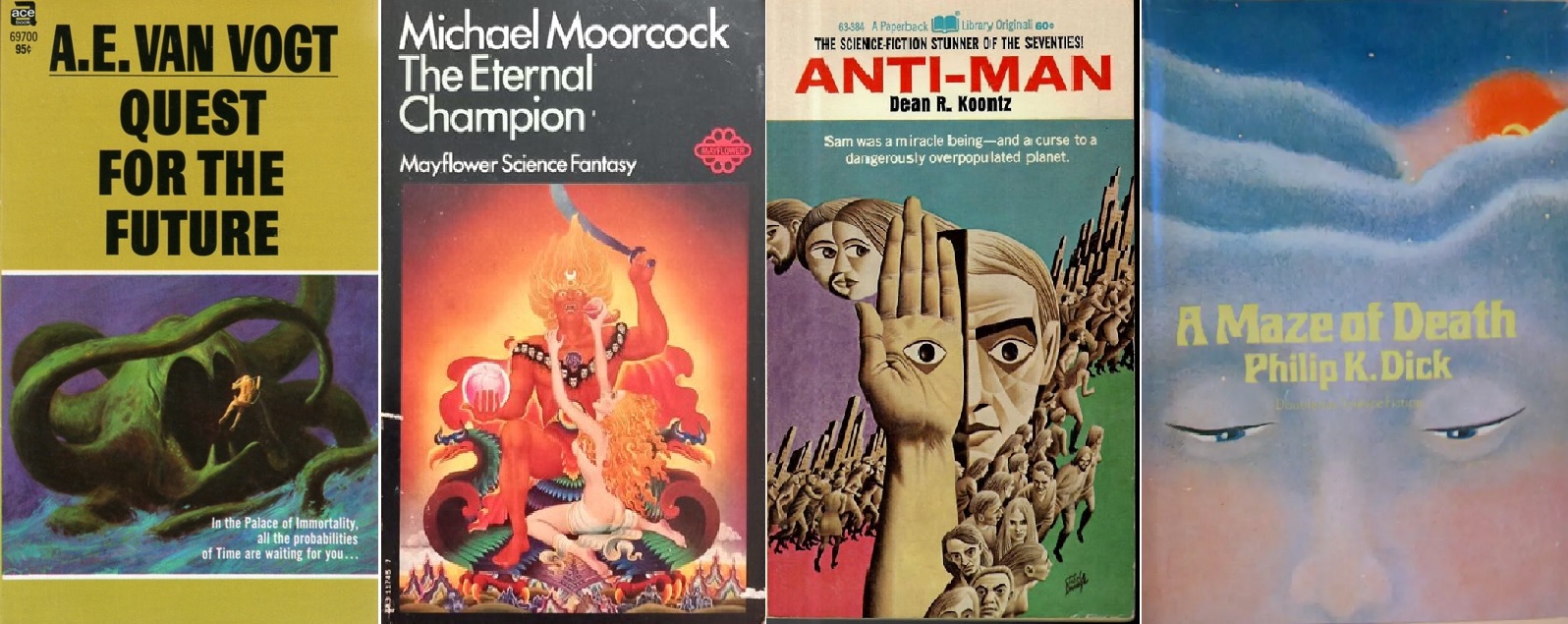
For our second of July's Galactoscopes, we have quite the mixed bag: two winners and two losers. Aren't you glad you've got us to navigate the dross for you?

We're breaking up this month's Galactoscope in two—and the dross leads the back. The next three books are all sub-mediocre, but the reviews are well worth the price of admission!
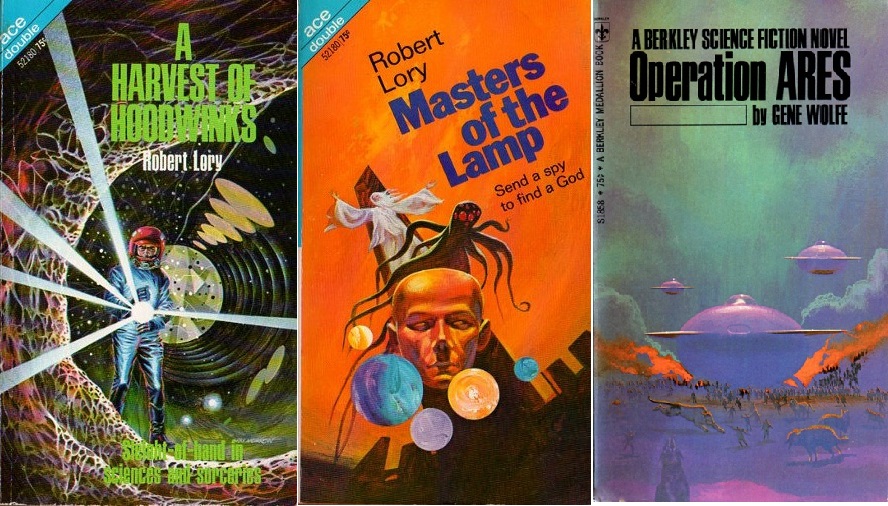
Continue reading [July 18, 1970] Two-star three step (July 1970 Galactoscope)

by Gideon Marcus
To Venus! To Venus!, by David Grinnell
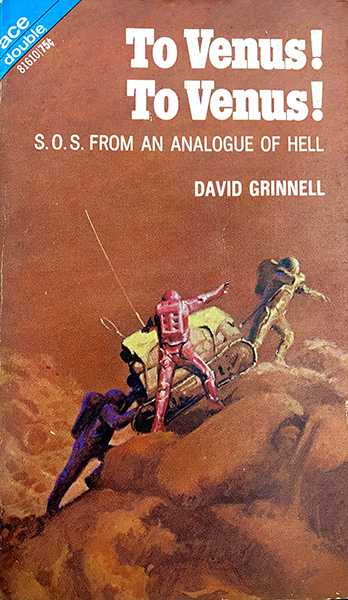
cover by John Schoenherr
Warning: the latest Ace Double contains Communist propaganda!
The premise to David Grinnell's (actually Ace editor and Futurian Donald Wolheim) newest book is as follows: it is the 1980s, and the latest Soviet Venera has confirmed the initial findings of Venera 4, not only reporting lower temperatures and pressures than our Mariner 5, but spotting a region of oxygen, vegetation, and Earth-tropical climate.
And they're launching an manned expedition there in less than two months.
Continue reading [March 14, 1970] To Venus and Hell's Gate… are we Out of Our Minds?
[New to the Journey? Read this for a brief introduction!]
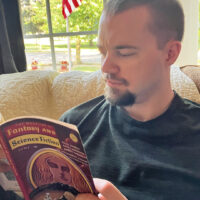
You may look at the byline for today's book of mine and wonder if your eyes are deceiving you; but no, that really is T. L. Sherred, who some older readers may remember as having written a few SF stories more than 15 years ago. Indeed, it has been so long since Sherred last appeared that it seems as if JESUS CHRIST HIMSELF had been born and then crucified in the interim, what with how much the field has changed since 1955. Now Sherred comes to us with what is apparently his debut novel.
Alien Island, by T. L. Sherred
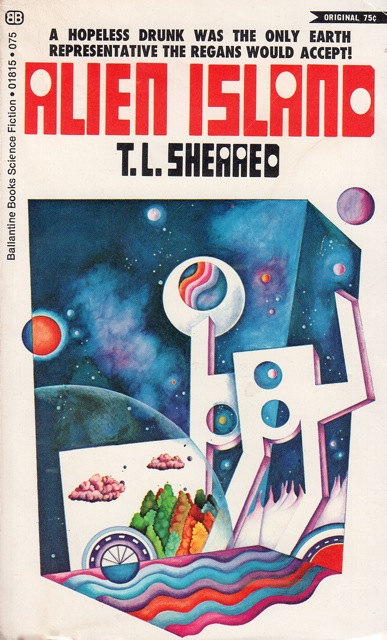
The gist of it is that humanoid aliens, called the Regans, have come to Earth, in the name of a kind of cultural exchange; it just so happens that they've landed in Sherred's home state of Michigan. Dana Iverson holds part-time jobs as a barmaid and cafeteria worker, but secretly she works for the CIA, thus acting as our eyes and ears for the story that unfolds. A barfly buddy of Iverson's, Ken Jordan, gets randomly (or at least it seems random) selected as Earth's ambassador for the meeting with the Regans. For the Regans' part, they've provided the unrealistically gorgeous space captain Lee Kay Lukkari. The idea is that Jordan and Lukkari merge personalities and memories, quite literally, such that they learn of each other's cultures in about as direct and intimate a way as one can imagine. The neutral ground, which Jordan soon enough transforms into a kind of Xanadu, is the island of the book's title, positioned on the US-Canada border, just outside Michigan.
What could possibly go wrong? Actually, quite a lot.
Readers with good memories may recall a very good story of Sherred's from a very long time ago, "E for Effort," which involves a seemingly innocuous invention (a time-viewer that the characters use to their economic advantage) but which soon comes to have apocalyptic consequences. I have to say I'm a bit confused as to why Sherred, who for all I know has spent the past 15 years selling used cars, should suddenly emerge from hibernation with this specific novel. It's not that Alien Island is a bad novel exactly, but rather that while it follows a similar trajectory to that minor classic of Sherred's that I mentioned, and while it seems to come from the same place of pessimism regarding humanity's future in the wake of the atomic bomb, this is a narrative that doesn't benefit whatsoever from being rendered a novel. Certainly it would have worked better as a novella, given the small cast of main characters, the claustrophobic setting, and the single-mindedness of its message. The sad part is that it's by no means a bad message.
The other question I have to ask is why Sherred waited until, say, the past few years to write this novel of his. True, there are passages wherein the characters discuss sex, in a pretty inoffensive fashion (those expecting steamy human-on-space-babe intimacy will come away disappointed), but the language is more or less clean. I will say, it's not often you read an SF novel by one of "the old guard" these days and have the protagonist/narrator be a woman; that much of Iverson's conflict comes from her jealousy of Lukkari and her ill-hidden affection for Jordan is not as steep a price to pay as it sounds. Another thing to its credit is that Alien Island is a satire with a point to make, which I understand is going off of a low bar, but it still distresses me how many alleged satires strike me as utterly vacuous. Similarly to "E for Effort," this is basically a story about the pinhead humanity stands on, between nuclear annihilation and possibly ascending to a higher place. With "E for Effort" it was a time-viewer, whereas with Alien Island it's intervention on the part of some benign, if hard-to-read aliens.
One more thing: Without giving away specifics, I was worried that Sherred's novel would repeat the black hole of nuclear doom that "E for Effort" headed for by its end; but this novel's ending, which has a strangely biblical resonance, could be considered cautiously optimistic. Incidentally, "cautiously optimistic" is how I also feel about Sherred returning to the field after so long.
Three stars, but I was hoping for more.

by Winona Menezes
Ace Double 89250
The Winds of Darkover, by Marion Zimmer Bradley
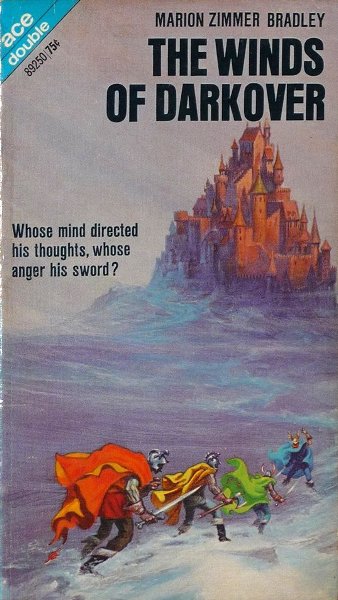
by Kelly Freas
This month’s Ace Double gives us the fifth story set in Marion Zimmer Bradley’s Darkover universe. A standalone story, The Winds of Darkover requires no prior knowledge of the series.
Generations removed from the colonists from whom they descended, the people of Darkover, a little waystation planet, live in an archaic feudal society lorded over by a ruling class with psychic abilities. Deep in the mountains, one of these noble families is thrust into turmoil when a bandit tribe lays siege to Storn Castle, and to save her family Lady Melitta of Storn is forced to flee in search of aid.
Seemingly unrelated, high above the planet a disgraced spaceport dispatcher named Dan Barron is unceremoniously relieved of his position after a paralyzing psychic vision renders him useless in an emergency and endangers the lives of several pilots. To salvage his employment he is sent on a humiliating planet-side mission at the request of the Darkovan Lord Valdir to instruct his men in the construction of lenses used in telescopes. Barron agrees reluctantly, but the psychic visions that cost him his job continue to plague his mind and body.
Bradley’s setting is dazzling; Darkover is unmistakably reminiscent of the Middle Ages, but filled with enough alien wonders and ancient history to give the impression that this world is much bigger than the little story it contains. The story, unfortunately, does its world little justice. Each event feels cobbled together out of necessity, and the sum of the parts is a story that jerks from one scene to the next with little regard for cohesion. The third act is so brief that the resolution feels unearned. My biggest issue, however, was the baffling choice to write one of its main characters out of importance.
Melitta of Storn is driven from her besieged home with the fate of her family entirely dependent on her wit and bravery, and seems like the obvious candidate for the heroine of a pulp fantasy. Rather than do the obvious, however, Bradley is apparently content to allow Melitta to gradually fade into the background with little impact on the plot. Until, of course, it is time for her to be the milquetoast half of a romance with Barron so under-baked I found myself checking to make sure I hadn’t accidentally skipped any pages.
The Winds of Darkover is a serviceable but ultimately skippable installment in the Darkover saga. It is buoyed only by its fantastical setting, and the story a disappointingly uninspired patchwork of genre fantasy staples. Two stars.
The Anything Tree, by John Rackham
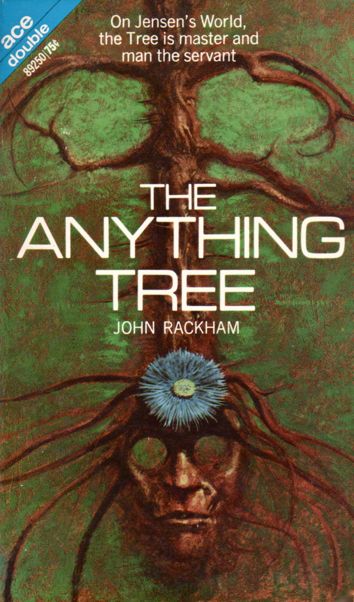
by John Schoenherr
The other half of this Ace Double is The Anything Tree by John Rackham, and I found myself enjoying this one a lot more than I thought I would upon reading the opening pages. The first few paragraphs describe the heroine flippantly enough that I thought the rest of the book was going to be dismissive of her, but once the plot picked up I was pleasantly surprised.
Selena Ash is a covert agent sent on a mission by her father’s company to locate the planet of a tree with miraculous properties, and she does so under the guise of a thrill-seeking socialite who enjoys interplanetary racing. A mysterious sabotage sends her ship crash-landing onto a lush forest planet that she believes to be uninhabited… until she runs into Joe, a fellow explorer who has inexplicably “gone native” and made this planet his home, loincloth and all. Joe acts as Selena’s guide as they traverse this obscure planet to escape her adversaries, and she slowly begins to understand that Joe has a certain kinship with the plant life that populates this planet. As she grows to share his affinity for the friendly alien flora, she realizes that his solitary existence might be less lonely than she had initially believed.
Some of the inciting incidents of the plot feel a little contrived, but I was more than willing to suspend my disbelief and enjoy this fantastically verdant paradise of a planet. Selena’s awareness of the existence of a kind of sapience possessed by the plants, not so much intelligence as base creature instinct, grows gradually enough to coax the reader along into an unwitting empathy with vegetation. Even the romance feels earnest and sweet, as the two protagonists are brought mentally and spiritually into togetherness by willingly joining the plants in their blissful existence. This unfamiliar way of existing is joyful in its inhumanity, compelling enough for me to ignore any plot contrivance or cliché and just be one with the greenery.
Maybe the contempt at the beginning of this story was justified, by Selena and all of humanity, me included. Rackham’s reverent wonder for the criminally unappreciated plant rings clear as a bell, compelling enough for me to set aside my dumb human logic and be reminded by the flowers of the joy of existing as a living creature. Four stars.

by Jessica Dickinson Goodman
Enchantress From the Stars, by Sylvia Louise Engdahl
Today, 230 young women are undergraduates beginning their Spring semester at Yale where this time a year ago, none were. The education of women is a profession as old as learning, but has only recently been taken up by a range of our nation's institutions of higher learning. Stories about young women's minds, as opposed to their bodies or the uses men find for them, are as welcome and necessary as air.
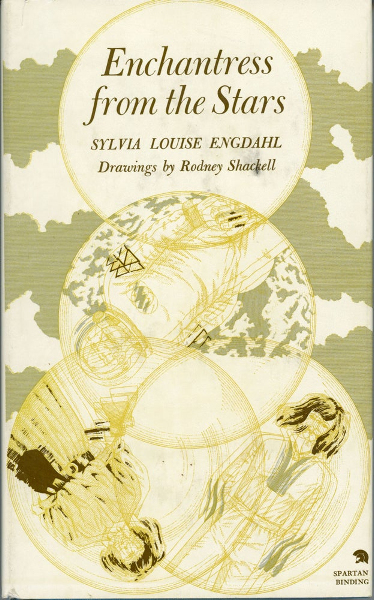
Enchantress from the Stars is a story of a young woman's exploration of her world through the worlds – and worldviews – of others. This story has three alternating perspectives but Elana's view is the central one, with scenes through Jarel and Georyn's eyes weaving around it but never overwhelming the forthright and careful way Elana approaches her story.
This is a story fans of Star Trek would deeply enjoy, with its Federation and moral imperatives not to interfere, its mix of timelines and technologies, and most of all, its earnest heart. It brings a duty-bound respect for and curiosity about all living things that fans of Nurse Chapel and Lieutenant Uhura – as well as Kirk, Spock, McCoy, Sulu, and Chekov – might enjoy.
Elana's world is divided into thirds, with her society at the top, as those who have control over the power of both machines and minds. Jeral's society is second tier, with control over mechanicals like space ships and mining engines and laser weapons, but no psychic powers. Georyn's world languishes in the bottom third of the power hierarchy, medieval with no machines and no mental powers, but he does hold a belief in magic that allows him to understand the world around him in some ways that are initially lost on Jeral.
The "dragon" that appears early in this story shows the deep potential for this tripartite frame. First, we hear of a dragon from Georyn and the number of people who have gone to fight it and never returned. Then we see through Jarel's eyes it is a fire-breathing forest clearing machine from the empire he serves in a junior capacity, and that the people Georyn has lost to the "dragon" are actually imprisoned by Jeral's colonizers. Finally, and most complexly, we understand the dragon through Elana's eyes, as both the monster of myth and of man, its terribleness and terror flowing from both wellsprings.
Enchantress from the Stars invites readers to engage in the kind of profound and transformative empathy that the best of science fiction and fantasy can draw from us. We see events from our own views as readers, from hers, from those of her father and coworker and the people she seeks to protect and those whose aggression she seeks to defuse. As I read, I found myself reinterpreting everything Georyn and Jeral said through Elana's view, a pleasant mental and emotional stretch that only grew more satisfying the more practice I had at it.
That juxtaposition between science fiction and fantasy is in a way at the heart of what makes Enchantress from the Stars so magical and remarkable, because the genre shifts depending on who is telling the story. Georyn's fantasy is Jeral's horror is Elana's science fiction. Most books ask us to walk in one stranger's shoes, and leave us better off for doing it; Enchantress from the Stars invites us to several views and gives us the tools to truly understand them.
In this moment where professors are having to learn to address their students as "ladies and gentlemen" and not merely "gentlemen," I believe we could all use as much practice expanding our worldviews as possible, to include new genders, new perspectives, and as many new ways of being as we can in a never ending effort to fully understand what it means to be human.
Americans today live under a constitution that does not once include the word "she" or "woman" or "girl." It has been nearly 50 years since the Equal Rights Amendment was first introduced and it still, still has not passed. Maybe some of those young women at Yale will get it passed or their colleagues at the University of California at Berkeley, which is celebrating its 100 year anniversary of admitting women this year, will see it through.
Like Elana's world, ours is unequal. It is full of dangers and arbitrary death, patriarchies that bind and urge conformity and restrict human potential. It is also full of girls like Elana, boys like Georyn and Jeral, young people who are willing to challenge what they can see with their own eyes is wrong in the world. Who are willing to take what they are given by their fathers, older brothers, commanders, and societies and say: no, this is not for me; for me, I choose another way.
Enchantress from the Stars gives them and us the time and space to question, to discern what our worlds are and should be and can be. It is a novel that gives us readers a breath of time, a bare string of moments, to consider: what have we received today that we will reject, reform, and remake tomorrow? Who will we teach ourselves and others to be? Who will we become?
Who do we want to be?
(Four stars)
[New to the Journey? Read this for a brief introduction!]

by Victoria Silverwolf
Ladies of Darkness
Two very different novels by women fell into my hands this month. Just about the only thing they have in common is a downbeat mood. Even that, however, is treated in highly dissimilar ways by the authors. Let's take a look.
Shadows of Tomorrow, by Dorothy Daniels

Anonymous cover art. Woman running away from a mansion that has a light in one window? Must be a Gothic Romance.
The setting is Connecticut in 1895. The narrator is a nineteen-year-old woman named Cassandra whose mother has just died. Her father died soon after her birth, and she spent almost of all of her life in boarding school. Returning for her mother's funeral, she is dismayed by the fact that the only other mourners are her mother's second husband, who left her some years ago, and her mother's faithful Gypsy companion.
Her mother had the ability to predict the future. The villagers thought of her as a witch. Adding to their superstitious fear was a mysterious light that appeared in the sky at the time of her death.
Cassandra (an appropriate name, as we'll see) settles into the family home with the Gypsy and her stepfather. In true Gothic fashion, she wanders into the cellar in order to investigate a noise, only to barely escape being strangled by an unknown assailant. It soon turns out that Cassandra also has precognition, which she considers to be a curse rather than a gift.
Other Gothic elements include a séance conducted by the Gypsy, a secret room in the mansion, and a murder. Since this is also a Romance, we have a handsome young stranger show up.
The novel definitely follows the pattern of a Gothic Romance. Fans of that genre, or of the Gothic soap opera Dark Shadows will find it satisfactory, if less than original. It's a quick, easy read, suitable for light entertainment of an enjoyable spooky nature.
Three stars.
A Sweet Sweet Summer, by Jane Gaskell

More anonymous cover art.
The narrator is a young man named Pelham, known as Pel. He is also called Rat. In a dystopian near future, he and his father run their home as a combination boarding house and brothel. His cousin Frijja shows up, having barely survived a brutal attack. You see, the aliens told him to take her in.
The aliens? Yes, it seems that gigantic extraterrestrial spaceships hover over the British Isles. A force field isolates the inhabitants from the rest of the world, leading to a breakdown in society. The aliens send messages to people in the form of small talking spheres, something like ball bearings. Failure to obey their orders leads to disintegration.
The aliens put various parts of London under the control of gangs, some Communist and some Fascist. Early in the book, Frijja defends the home from an invasion by the Fascists in a violent way. That doesn't prevent them from taking over pretty soon anyway.
The other major character is Connor, one of the Fascists. Pel is obsessed by him, although he tells the reader that it's not in a sexual or romantic way. (Frankly, methinks the fellow doth protest too much.) In turn, Connor is obsessed by Frijja. This triple relationship is complicated, blending love and hate in strange ways. It's also the heart of the book.
Without going into the myriad plot complications, let's just say that this unlikely trio goes on an odyssey through a transformed England. Along the way we get more violence, rape, sexual blackmail, and cannibalism.
This is a very grim book, as you can tell, although it's also got moments of bitter humor. Despite the aliens, who never show up in person, it's much more like A Clockwork Orange than Childhood's End. The narrative style is dense and eccentric, so this is a book that requires careful reading.
Five stars.
The Older Generation and the Newer Generation

by Jason Sacks
The Three Faces of Time, by Frank Belknap Long
I usually love writing for this column. I have tremendous fun exploring the work of promising new writers, or obscure works to which I can provide some attention, or even to celebrate the work of an acknowledged science fiction master.
But it provides me no joy to discuss The Three Faces of Time by Frank Belknap Long.
Mr. Long, born in 1901, has a long and distinguished career in science fiction and horror. He's published dozens of books which often sit in the uneasy and unsettling boundary between science fiction and horror. His many short stories were foundational in the golden years of the classic Weird Tales pulp, often sitting side by side in a given issue next to his close friend H.P. Lovecraft and exploring similar mythos and settings.
I frankly love the classic work of Messers. Long and Lovecraft for their gothic, creeping horrors and their inescapable dark energy.
But that work was released 30 plus years ago, and I'm sad to say that Mr. Long, now well into his Social Security years, is no longer the writer he used to be. Or, more accurately, he's too much like the writer he used to be.

The Three Faces of Time is, frankly, a bore. The writing is turgid, characters are wafer thin, and the plot simply refuses to become interesting.
A flying saucer has landed in a small suburban town. When people go to investigate the thunderous sound the spaceship makes, they become lost in a maze of incomprehensible pathways and confusing signposts, which all serve to alienate all the people from their environments.
We follow Susan Wentworth as she tries to find her husband and her children in such a space, where she does eventually catch up with the family – and some mysterious aliens. The strange creatures then transport the humans thousands of years into the future in search of some sort of truth about human immortality – or something like that. I think that's what happened; my attention kept wandering as I tried to make my way through endless thickets of run-on sentences, inhuman dialogue and exhausting conceptual obtuseness.
This would be a fun book in the hands of a more modern writer like Ellison or Brunner, who would highlight the confusion or the characters' existential doubt. Dick would have made the leads more full of angst, and LeGuin would have chonicled the beauty of the aliens' worldview. But Long is not of the newer generation. He reads like a man who's 68 years old and who time, sadly, has left behind.
I regret I have to give this book 1 star.
The Wizards of Senchuria, by Kenneth Bulmer
After my frustrating experience with Mr. Long's book, I was anxious for something that felt fresh, breezy and contemporary.
The Wizards of Senchuria by Kenneth Bulmer was just what I needed.
I've had mixed experiences in the past in reading Mr. Bulmer's fiction. But this book was pure joy for me.
Senchuria is a breezy and bright story. It's a kind of updated version of the high-adventure stories which accompanied work by Lovecraft and Long in the old pulps, but updated for a more modern audience.

Scobie Redfern is a guy in his 20s on the way home from a game of tennis at a Lower Mahattan gym on a cold and snowy night. Scobie calls a cab, but at the same moment another man jumps into the taxi with him. The cabbie talks them both into sharing the vehicle, but quickly odd things start happening. Scobie catches a glimpse of a strange creature who seems to attack the car, and when his fellow passenger persuades Scobie to stop for a drink, a burger, and an explanation, so begins the wildest experience of Scobie's life.
Scobie soon finds himself in an adventure he hardly could have imagined, involving strange portals, terrifying creatures, love, hate, fear, battles on a grand scale, and the kind of nonstop adventurous life that would make a Robert E. Howard character feel exhausted.
This is one of those books where each chapter ends in a cliffhanger before the tension and silliness of the story rachets up even further, a wild, high-tension ride which gets much of its power from the reader wondering how much longer Bulmer can sustain his high-wire act.
Rest assured that everything in Kelly Freas's delightful cover actually happens in the book!
Maybe this book hit me so hard because I was so disappointed in the F.K. Long book above, but this was a thorough delight. The Wizards of Senchuria won't contend for a Hugo, but it's a nearly perfect half of an Ace Double.
4 stars.

by Victoria Lucas
Author Margaret Atwood and I are nearly the same age (she has a couple years on me). But she has published 5 books of poetry, and written a libretto–so far–and I'm sure she'll keep ahead of me. She has also just published this, her first novel. I've been wanting to read her work, especially since it (a) smacks of feminism at first glance, and (b) was written by a native of Canada, a country to which my husband and I aspire, and which we may yet reach as we slowly move north.

by John Schoenherr
I am a proud Stanford University alumna thanks to that university’s help finding me the money to go to school (student loan, job). As I understand it, the faculty have always believed that the school is not just there to teach about what students are going to do in life, but also help them discover what kind of person they will become. Clearly, as far as Atwood’s fictional alumna, Marian, is concerned, the school she attended (University of Toronto by the geographical and environmental clues) failed on both counts.
She is lost and feels formless, trying to understand what is required of her and fit into the molds offered. Every now and then she attempts to escape, finding some ease from the pressure of becoming a woman in today's society by running off the rails.
People in her life are mostly in a similar state of becoming and are extremely puzzled when she tries to run away–with one exception, a man she seeks without realizing she is looking for him. Clearly he has run off the rails himself and is possibly dangerous. But for Marian, sometimes danger is preferable to the destination of the tracks, perceived by her as motherhood (of which she is frightened) within marriage (although her roommate is at first set on motherhood alone), a job that is boring and expected to disappear with marriage, a life as a consumer of products such as girdles (worn by "vulcanized" women), and meals of real-life, killed animals.
Starting with strong reactions to types and cuts of meat reminiscent of the living beast, she begins crossing foods off her list of possible edibles as she tries to stay the course to the arms of her fiancé and their upcoming wedding. In a supermarket she “resents” the music because she knows it is only there to lull consumers like her into a euphoric state in which they will buy anything; her own fingers twitch to reach away from the market basket and pick up something–anything–with a "bright label." (I particularly identify with this: not only do I dislike the music itself, but I wish they would leave my mind alone, and I start talking to the speakers and gloomily thinking about bringing wire cutters and stair steps to the store.) After awhile, most foods are eliminated from her diet until she makes something she can eat.
Atwood’s book is funny with a dark humor, growing darker and funnier as Marian’s story unfolds. I give it 5 stars. Beautifully done.

by Gideon Marcus
Out of the Mouth of the Dragon, by Mark S. Geston

by John Schoenherr
The Biblical book of Revelations foretells of the final battle between Good and Evil. In this second book by Mark S. Geston (author of Lords of the Starship, which seems to be something of a prequel), Armageddon was just the first of climactic battles, subsequent ones being told of in the Book of Survivors, the Book of Eric, the Dialogues of Moreth. Thousands of years later, the diminishing forces of Earth, spurred on by crusading fury, continue to clash. The last ships, the remaining aircraft, the pitiful remnants of humanity are all drawn, sooner or later, to fight what will hopefully be the last fight at "The Meadows."
Born into this world is Amon VanRoarke, an aimless naif who finds motivation when the prophet Timonias comes to town on an ancient, motor-powered merchantman. The holy man's words fill VanRoarke with the urge to sail to The Meadows, not necessarily to fight, but simply to discover what has happened to the battered Earth, what consumes men to combat to the end.
So he sails on the Garnet, along with the drunken and dying veteran, Tapp, the religion-crazed Yarrow, and the half-sane ex-librarian Smythe, the last of whom has some borrowed knowledge of what the world was, though not why it's become what it has. Eventually, they arrive at The Burn that borders The Meadows, where a mighty army is encamped and ready to fight. There too is the "rim army", a force of strangers, origin (as yet) unknown. The stage is set for…something, but not what you expect.
Dragon is very much a mood piece, a commentary on the futility of war, and perhaps even of humanity (or at least, this cast of humanity). If Ballard were to write a catastrophe book, where the catastrophe is the red-steeded Horseman of the Apocalypse, this might well be the result. It's downbeat, descriptive, brooding, and more than a little surreal. It reminds me a little of the endlessly warring tankers of the Great Plains in John M. Foucette's post-apocalyptic The Age of Ruin, but more compelling, more deliberately written.
It's not a happy book, but it is an interesting one, and I had no trouble tearing through most of it in a single reading.
3.5 stars—others might rate it higher.

by George Pritchard
Rip-Roaring and Rollicking
As I have heard mixed reports about Lin Carter, it gives me great joy to report that his newest collection, Beyond the Gates of Dream, is simply delightful. The collection is written as a deliberate throwback to serial fiction and the heyday of Weird Tales, and in that sector, Carter (what a suitable name!) thrives. In this era of the New, Carter's writing can often seem antediluvian, so it is a joy to see those fins and gills be used as they were meant to be.

by Jeff Jones
My favorite story was actually the first, “Masters of the Metropolis”. Written with Randall Garrett, it describes the main character going from New Jersey to New York City in the modern day, except that he has “Wonder-sense” — the ability to see the incredible wonder that exists all around us.
Four stars.
“Keru” is one of the shortest stories in the collection, a Floridian horror story right out of Weird Tales. It has one of two female characters in the book, which is both accurate to the era Carter is recreating, and to Carter's sensibility as an author. Its racial politics are somewhat muddled, but it is leagues ahead of what Campbell is putting out.
Four stars.
The closest to New Wave that Carter gets is in “Owlstone”, but it's firmly in the slow, thoughtful realm of New Wave, rather than anything close to sexuality and gender. I enjoyed it, particularly the ending. The story is from the perspective of a slave creature, who is used by the leader of Earth to fly through space and meet with the leaders of other planets. Called to communicate with the computer who commands the universe, the leaders discover they are being replaced by computers. But what will happen to the slave creatures?
Four stars.
“Harvey Hodges, Veebelfetzer” is an attempt at a SFF comedy epic short story. There is potential in it, but it is all so tangled up with early-author nonsense that should have been trimmed back long ago that even said author apologizes for its existence. It is not bad in a way that makes me angry, but it needed considerably more work, that it did not necessarily justify. It’s definitely the weakest of the lot.
Two stars.
There are two sections of unfinished stories, which I am not rating. The stories are not finished, so it does not seem fair to judge them just yet.
Admittedly, this collection is best taken in slowly, as Carter's joy coming through the pages can often be overwhelming if read for long periods. I was reminded of interacting with a particularly exuberant horse, or a large puppy, in book form. If frequent fannish winks, nods, and asides fill you with annoyance and dread, I do recommend avoiding this book. He writes such notes at the beginning and end of each story, and at the beginning and end of the book, like a joyful
3.5 stars if you like this sort of thing, one star if you don't.
But why shouldn't Carter be excited? He was allowed to finish a posthumous Conan story, and that tale, “The Hand of Nergal”, takes up the majority of the book. I enjoyed it as a Conan story, and was glad to see Carter avoid the numerous potential pitfalls that Howard set up in his world and writing style. This is a place where Carter’s weaknesses in the New Wave become strengths in the old. Lucky for the reader, despite Conan’s supposedly barbarous nature, he has little interest in the beautiful servant girl who briefly crosses his path, before going to destroy the demonic vampires threatening the world! I wonder if this is related to Conan’s mighty thews in any way, after the revelations in Sports Illustrated back in June regarding the significant use of steroids in professional sports.
3.5 stars.
”So close your waking eyes/And picture endless skies” — and wonder!
Four stars overall.

by Gideon Marcus
Sputnik all over again?
Last week, the Soviets produced their latest space spectacular, potentially leaving America in the dust again. Zond 5, launched September 14, was sent around the moon, returning safely to Earth on the 22nd.

It's tempting to say, "What's the big deal," right? We've sent probes to the moon, too, and the Russkies have orbited lunar satellites and soft-landed spacecraft. What's special about Zond? Well, it's suspected that "Zond", a monicker usually reserved for interplanetary spacecraft, is really a lunar-adapted Soyuz. That means the Communists have completed a successful, robotic dry run for a human mission to the moon. We haven't even launched our first manned Apollo yet!
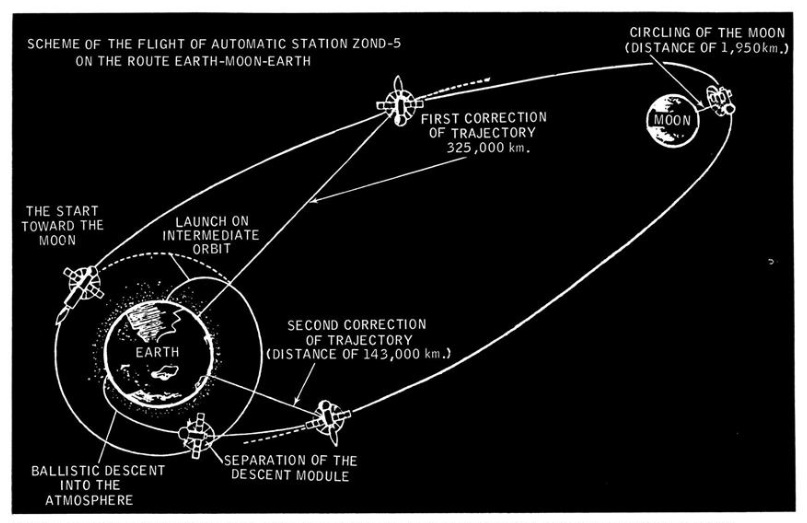
So we're in something of a race. Apollo 7 will go up in a couple of weeks, testing the spacecraft for an endurance run in Earth orbit. Apollo 8 is due to be a circumlunar shot, to be launched near the end of the year. That's the one to beat: if the Soviets make that journey before us, that'll be a feather in their cap.
That said, while our program was delayed 20 months due to the tragedy of Apollo 1 last year, the Soviet lunar program has undergone some setbacks, too. Most notably, their Saturn equivalent appears to be having teething troubles. While they might be able to send a Soyuz around the moon with their current rockets, landing cosmonauts will require a beefier launch system. Our Saturn is already man-rated.
If I were a betting man, I'd give the odds of the Soviets beating us around the moon at around 50/50. But as for landing on the moon, which is still planned for some time next year, I think we're still favored to win that one.
The medicine
This month's issue of Analog starts off extremely well. Savor the taste of the opening piece, as it's what will sustain you through the rest…
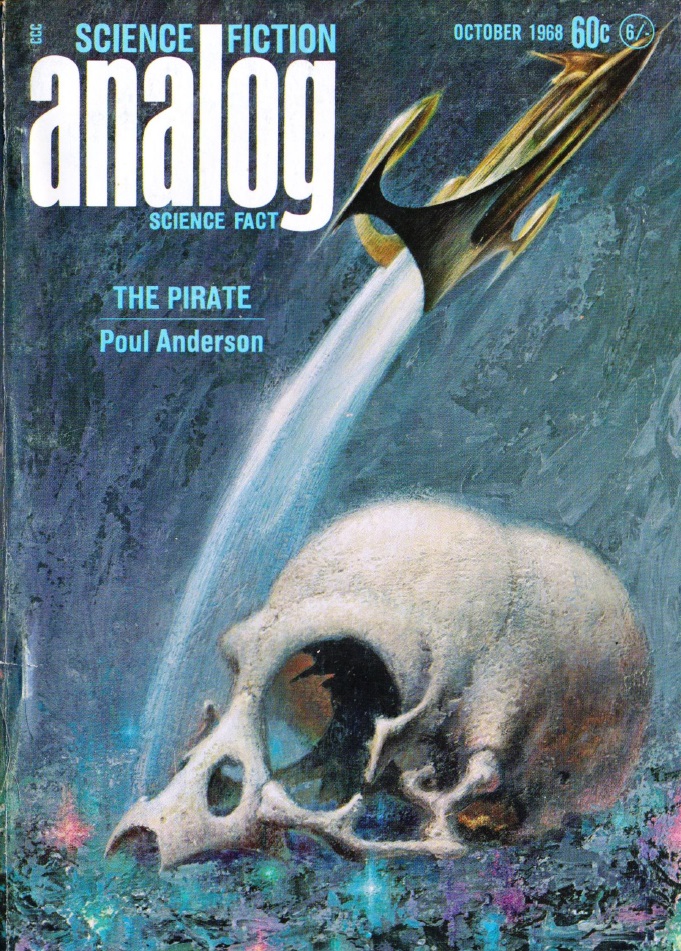
by Kelly Freas
The Pirate, by Poul Anderson
Trevelyan is the agent of an arcane, galaxy-wide service. Most of the such agents are employed for scouting, search and rescue, and mediation services. This time, Trevelyan is on a mission of crime prevention. His suspect: Murdoch Juan and his partner, Faustina. Ostensibly, they aim to set up pre-made colonies on the marginal world of Good Luck, offering transport and homes to settlers at a bargain. Trevelyan knows such endeavors are never profitable, and he suspects a shady angle.
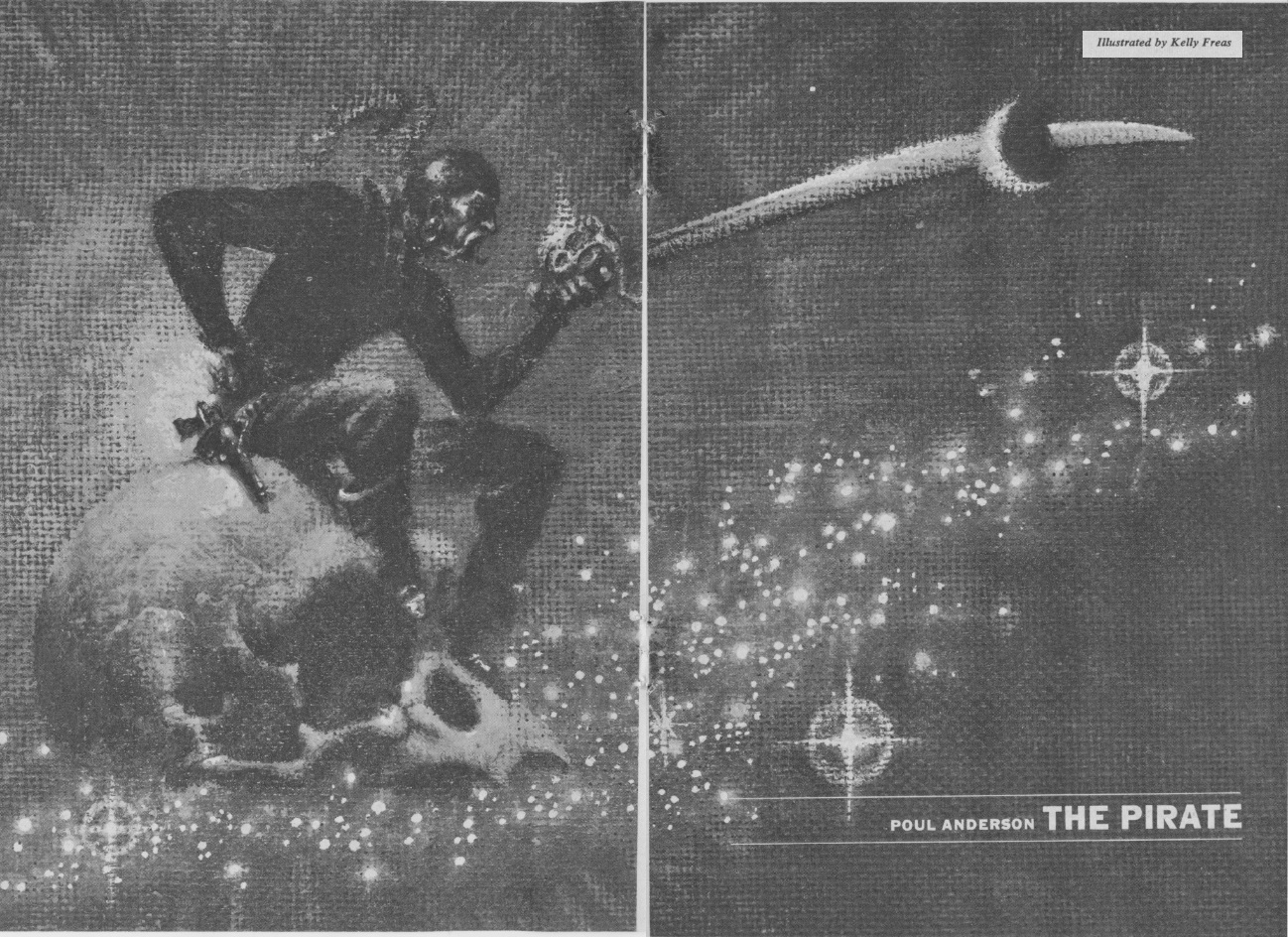
by Kelly Freas
Such concerns are confirmed when he and his alien shipmate, Smokesmith, discover Murdoch's true target: a once-inhabited world, seared with abated radiation, abounding in empty cities ripe for occupation. But is that what the dead race would have wanted?
Poul Anderson's writing ranges from turgid to sublime. This piece is much closer to the latter end of the scale, and it benefits from lacking the author's typical linguistic tics. In addition to being a good read and an excellent depiction of a true alien race, I appreciate the moral questions raised and the conservationist attitude expressed. This would be good required reading for any apprentice building contractor or would-be Schliemann.
Five stars.
Mission of Ignorance, by Christopher Anvil
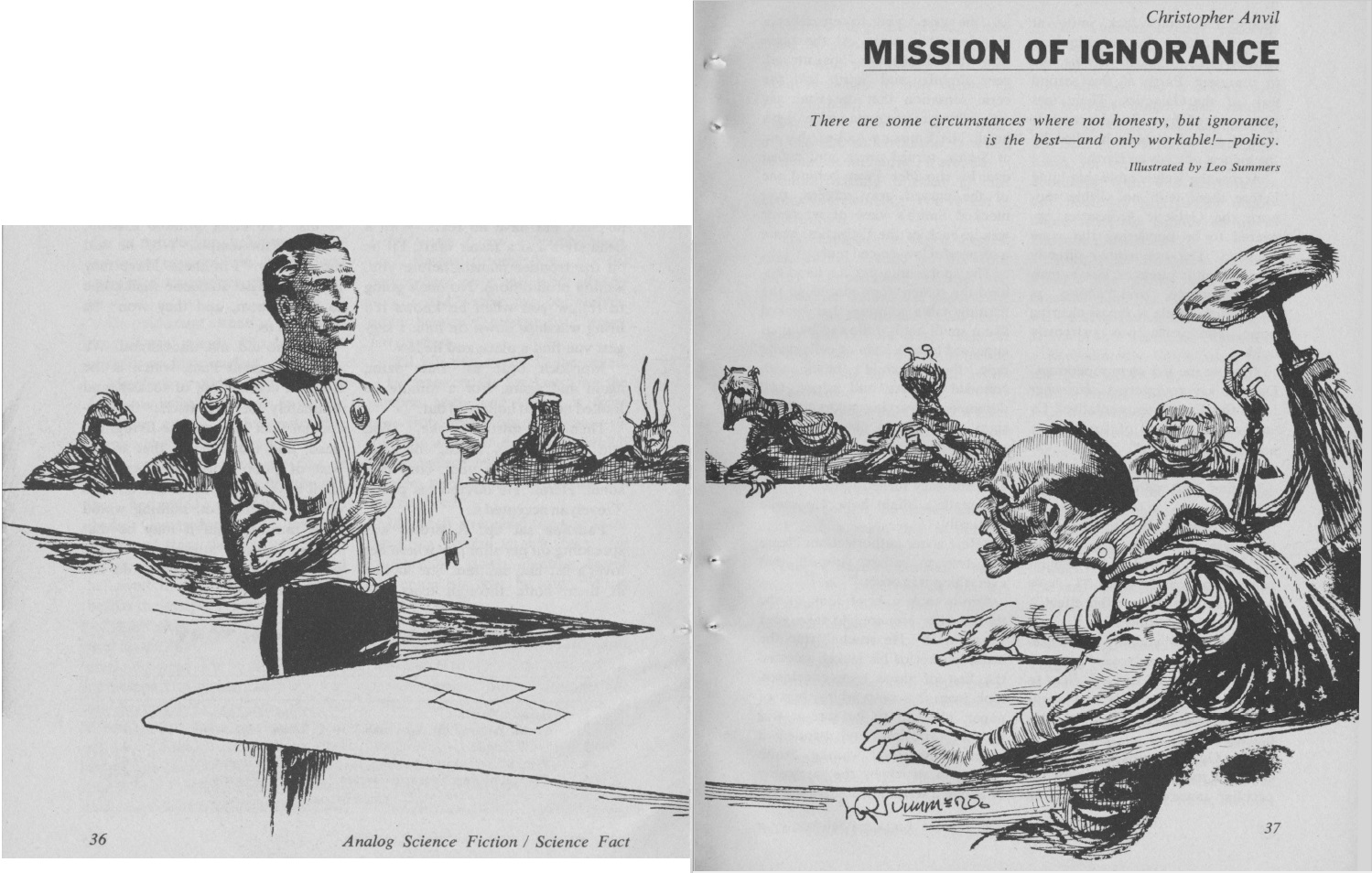
by Leo Summers
The galactic aliens have returned. Last time, they brought three gifts to revolutionize our food production, our computers, and our birth control—and leave us completely at their mercy. This time, Earth is being a bit more circumspect. Rather than accepting the ambassadors with open arms, a buck 2nd Lieutenant is dispatched to treat with them—with absolutely no briefing at all, but with a set of instructions designed to terrify and befuddle the extraterrestrials.
I often joke that every Chris Anvil story begins with [Military rank] [Name] [present participle verb], and this is no exception. I also, less jokingly, note that Chris Anvil's stories for Analog tend to be smug, stupid affairs. Thus, I was surprised to find I didn't hate this piece. It is somewhat smug, and the latter half is all explanation, but the premise is kind of interesting.
Right on the 2/3 border. I'll be generous and say three stars.
Taking the Lid Off, by William T. Powers

The "lid" in this science article refers to Earth's atmosphere, which prevents us from seeing the universe in most of the interesting wavelengths like X-ray and infrared. Powers, who wrote a terrific article on measuring charged particles last year, offers up a less impressive, but serviceable piece on lunar and orbital telescopes. It's just a bit less coherent than his last article, and with fewer revelations, although I did appreciate his explanation of using gravity gradients to stabilize satellites.
Three stars.
The Steiger Effect, by Betsy Curtis
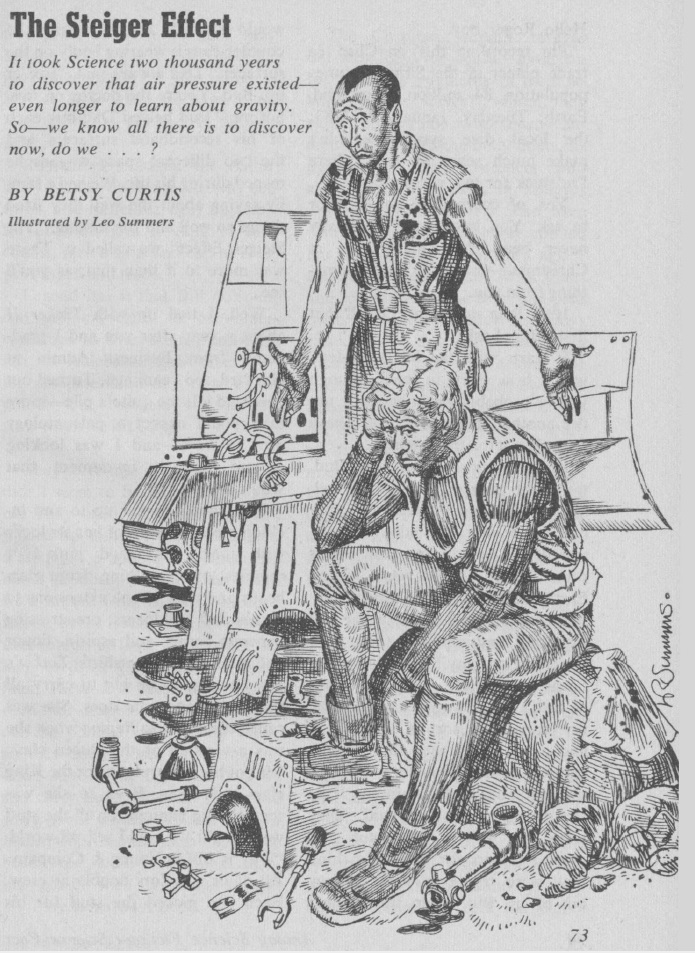
by Leo Summers
Human merchants arrive at a planet that views internal combustion as a kind of witchcraft. Nevertheless, they buy our engines when they are demonstrated to work. But the engines all mysteriously conk out when humans reach a certain distance away. Turns out they—and all internal combustion engines, everywhere—run on psi energy, and always have. 'Humans secretly have psi powers and don't know it' certainly sounds like a plot tailor-made for Campbell, doesn't it?
Never mind that the premise makes no sense; the division of the (otherwise completely humanoid) alien society into "Men" (those who do with their minds) and "Boys" (those who do with their brawn) hews too close to a metaphor of antebellum days in the American South for comfort.
One star.
Underground, by Lawrence A. Perkins
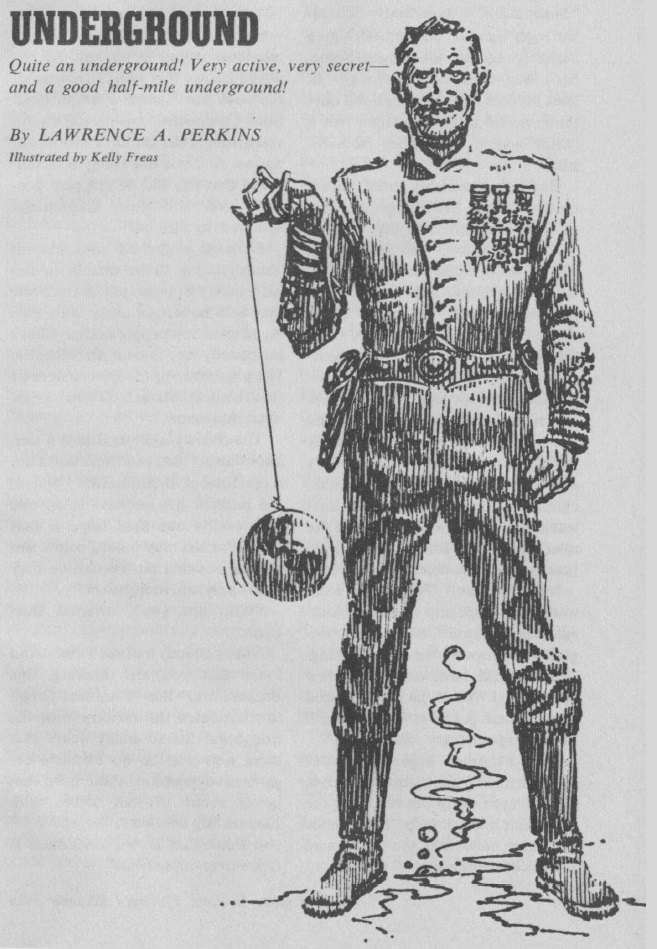
by Kelly Freas
A senator is kidnapped by a Latin American insurgency that plans to harness earthquakes to topple their oppressive dictator [a plot reminiscent of the Doctor Who episode "Enemy of the World" -Ed].
This piece reads like one of those Ted Thomas mini science articles from F&SF turned into a story, except there's no real story—just a lot of show and tell.
Two stars.
The Tuvela (Part 2 of 2), by James H. Schmitz

by John Schoenherr
Last installment, we learned that the colony of Nandy-Cline was about to be invaded by the rapacious Parahuans. The only thing holding them back was the concern that humanity was led by a shadow cabal of "Tuvela", a subrace of genetic supermen. Now, the security of the world lies in the hands of the youthful Dr. Nile Etland, who must convince the Parahuan that she is one of the mythical Tuvela. Luckily, she has a quartet of sapient otters as wingmen…
This is a frustrating novel. The premise is excellent, and Schmitz is one of SF's few authors who lets women be heroes. What keeps this book at the three-star level for me is the lack of characterization. I have a vague idea of who Ticos Cay is, the two-hundred year old man who we meet as a prisoner of the Parahuan. I even kind of know the various Parahuan. But Etland is a cipher, utterly uninteresting as a person. She goes through her James Bond maneuvers with competence and a few jitters, but with precious little demonstration of a soul.
My nephew enjoyed this serial a lot. It is creative, and the biology of the world well realized. If only I could say the same for Nile Etland.
Three stars.
Doing the math

Thus ends the month with Analog clocking in at 2.9, just under the 3-star line. Ahead of it are The Farthest Reaches (3.4), Fantasy and Science Fiction (3.1) and IF (3.1). The pack below it is far below—Galaxy (2.4), Worlds of Fantasy (2.3), and Fantastic (2).
The worthy stuff would fill two magazines, which would be an impressive amount if it hadn't taken seven publications to produce it. Women penetrated the magazines pretty well this month, but their lack of pieces in Worlds of Fantasy and The Farthest Reaches brought the aggregate percentage down to 11%.
And so, with science fiction as with science fact, we find ourselves in a bit of a holding pattern, awaiting what's to come next month. But whether it's the Soviets or the Americans, Campbell or Ferman, someone will entertain us.
And that's worth being ready for!

[Stop Press: Mark just got his reviews of this month's New Worlds to me. It's too late to run an article, so we'll be doubling up next month. For the sake of statistics, however, the magazine raises the amount of worthy material slightly, and it reduces feminine participation in SF magazine prose for October 1968 to 10%. Stay tuned…]

by Gideon Marcus
In the backround (and sometimes the foreground) of my reading of this month's issue of Analog was the Democratic National Convention held over four tumultuous days in the Windy City. This was not four days of politicians patting themselves on the back, as we saw in Miami Beach for the GOP Convention—amid the citywide busdrivers and telephone workers strike, there was tumult, walk-outs, protests, and a general breakdown of the democratic process.

Il Duce, Mayor Daley, intent on turning his town into a police state in the pursuit of Law and Order: 12,000 cops plus a contingent of National Guard were on hand last weekend.
The writing was on the wall that first day when Julian Bond arrived with his alternate set of Georgia delegates, the group that broadly represented the demographic makeup of the Georgia Democratic Party. First, they were not even allowed in; then they were grudglingly placed in the cheap seats of the balcony. All while Daniel Inouye, Senator from Hawaii, gave a stirring, unprecedented keynote speech in which he decried the anarchy and violence occurring outside the convention halls, but nevertheless put on the assembly the responsibility of rectifying the racial injustice that led to such agitation.
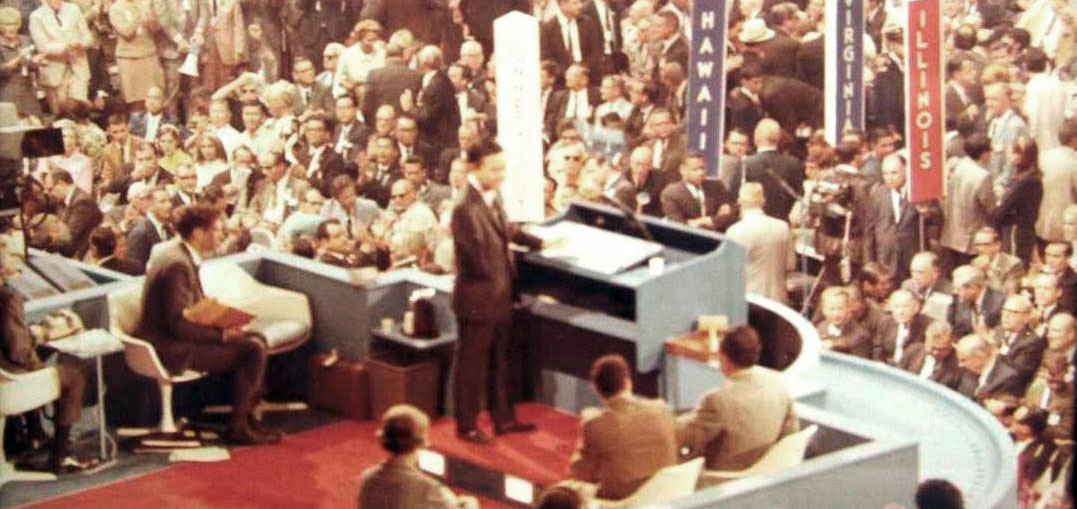
Eventually, the delegates prepared to vote on the certification of the Georgia delegation that had been approved by the party—the less integrated one. Actually, first they voted on if they were going to vote on it that evening. It was during this battle that the Michigan delegation offered their seats to the alternate Georgia delegation, a move that enraged members of the "official" delegation.
With regard to who was going to get the Presidential nomination, by the end of the first night, it was clear McCarthy was a dead duck, and few were mentioning McGovern. However, there was a rising "draft Kennedy" movement that peaked on Day 2 despite Ted repeatedly saying he wasn't interested. More dramatically, Day 2 marked the day police evicted 1,000 protesters from nearby Lincoln Park, CBS correspondent Dan Rather got punched by plainclothes security for not wearing his credentials prominently, dozens of delegates, mostly Black, walked out, and Georgia Governor Lester Maddox took his ball and went home, saying he was going to stump for segregationalist independent candidate, George Wallace.

Don't let the door hit you in the ass on the way out…
And that night, I'm pretty sure they still hadn't certified the Georgia delegation.
On the third day, 10,000 protesters gathered at Grant Park, a terrific anti-War demonstration broke out on the floor of the convention, and the minority position tried in vain to make an end to bombing North Vietnam a part of the party plank. By the time Humphrey was anointed the candidate (a foregone conclusion by that point), it was an anti-climax and anything but a triumphant coronation. And what a change twenty years has wrought: the Southern delegations that walked out on the convention in '48 are now behind Humphrey, where the liberals who admired the fiery populist now reject the man they view as Johnson's stooge.

Discontent was rampant. Delegates were frustrated that they were not listened to, that the motions they were voting on were not sufficiently explained, and that Mayor Daley was strong-arming them into voting the way he wanted them to. Not to mention that there wasn't enough food to feed everyone in the convention's vicinity, and the hot dogs on site were terrible. Many said 1968 marked the death of the party convention, at least in its current incarnation.
But the political strife was as nothing compared to the rivers of blood that were shed as blue-helmeted cops clashed with protestors. "The Whole World is Watching" and "Fuck LBJ" intertwined with shouts and screams, and all of it was televised in full color (but not live, as that was impossible due to the strikes and Daley's security efforts).

The only bright spot of that third evening was the nomination of D.C. and Black native son the Rev. Channing Phillips, the first American of African descent to be nominated by a major political party for President.

By the fourth day, I was exhausted, yet I tuned in anyway. I'm glad I did. That evening, the convention played a retrospective on RFK. It was too hagiographic, and frankly, the wounds too fresh to bear close watching, at least for me. But when it was over, something amazing happened. Virtually the entire audience of delegates, excluding just the groups from Texas and Illinois, rose to its feet and began clapping. Louder and louder, and then they started singing "The Battle Hymn of the Republic." Over and over, "Glory Glory Hallelujah, His truth is marching on." Daley's henchmen tried to impose order. They gaveled. They called out the Sergeants-in-Arms. Nothing deterred the delegates. All of the anger, all the discontent, all of the frustrated might-have-beens boiled over in that moment into this display of singing, of shouting, of clapping.
It was only defused when a moment of silence was called for the memory of Dr. King, and then the convention could continue. The business of the moment was the nomination of a Vice President. That morning Humphrey had already tapped Senator Edmund Muskie of Maine, and there was no serious opposition.
Yet, and in a truly touching moment, Julian Bond's name was advanced as a candidate (so, the first Black VP nominee of a major party in history), and he garnered 27 and a half votes before voluntarily withdrawing his name. Humbly, self-effacingly, he noted that he was too young to accept.

Bond withdraws his name from consideration.
Muskey and Humphrey gave their acceptance speeches that night. There was a lot on their shoulders—the need to deliver speeches that thread the needle, knitting the party back together, both addressing and condemning what had happened in Chicago.
That didn't happen. What we got was a limp flatness of platitudes. When I woke up, I learned that 20 delegates, supporters of McCarthy, had been beaten up in their hotel and arrested. The charge pelting the cops with sardines. McCarthy pointedly did not congratulate Humphrey that morning; the Vice President, now the newly christened candidate, had made no comment on the incident, tacitly endorsing it.
So that's that. HHH is our bulwark against Nixon. Muskie is his backstop. Wallace just got a shot in the arm, and I can only think that's a blow against Democratic hopes. Americans are disunited as we have not been for many decades.

It is hard to go on with my assigned task after all that, but the job remains, and I'm the one who has to do it. The convention was four days of Hell. Accordingly, the September 1968 issue of Analog was a slog, too, though of a different kind.
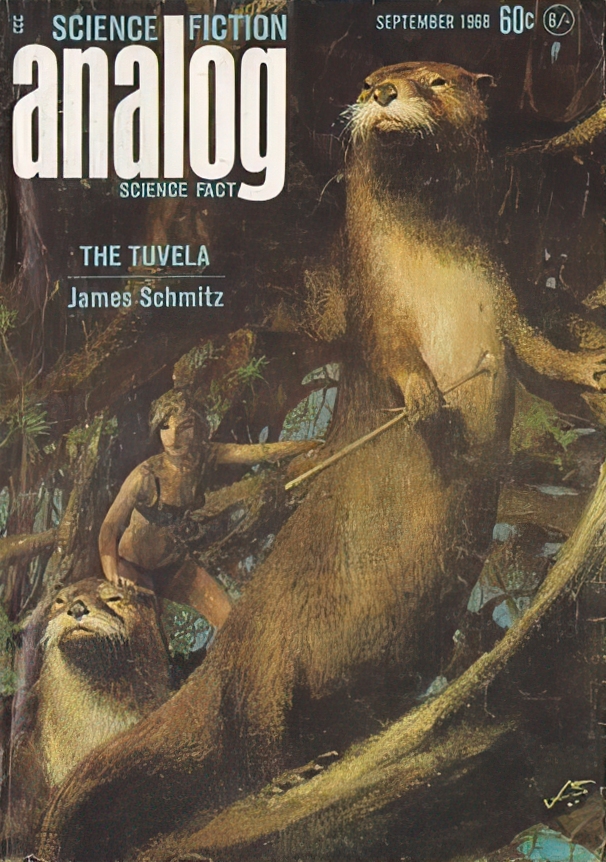
by John Schoenherr
The Tuvela (Part 1 of 2), by James H. Schmitz

by John Schoenherr
The ocean planet of Nandy-Cline is in the sights of the Parahuans, a rapacious race of aliens that was beaten back by the Federation seventy years ago, and wants another try at the apple. They're being cautious. The humans beat them once, which is almost heresy to the arrogant Parahuans. To justify losing to the inferior homo sapiens, they decide there must be a secret cabal of superhumans that leads and coordinates our species. They must know more in order to sway political power from those supporting the Voice of Caution to those in favor of the Voice of Action.
To that end, they have set up a submarine base on the planet and abducted the human, Ticos Cay. Why? Because he is nearly 200 years old and seems to have found the secret of immortality. It is clear to the Parahuans that he must be in the employ of the "Tuvelas", our putative ubermenschen. They torture him, at length, but he resists because the same disciplines that have extended his life also grant him the ability to blot out pain. Nevertheless, he will succumb—unless he can get outside help.
Enter Nile Etland, a young biologist living on Nandy-Cline. She and her two giant mutant otters, sapient and clever, are looking for Cay, who has disappeared from the floating island where he was doing research. Cay's only hope is that the Parahuans will take Etland for a Tuvela and treat her with comparative kid gloves, testing her abilities, rather than killing her outright.
Etland, to her credit, is up to the challenge…
The premise for this one is excellent, and something I love about James H. Schmitz is his ability with (indeed preference for) featuring heroines over heroes. That said, the writing in this piece is often plodding and explanatory, and I found my momentum frequently flagging.
So, three stars for this installment. Now that all the pieces have been set up, perhaps the next half will be more exciting.
The Powers of Observation, by Harry Harrison
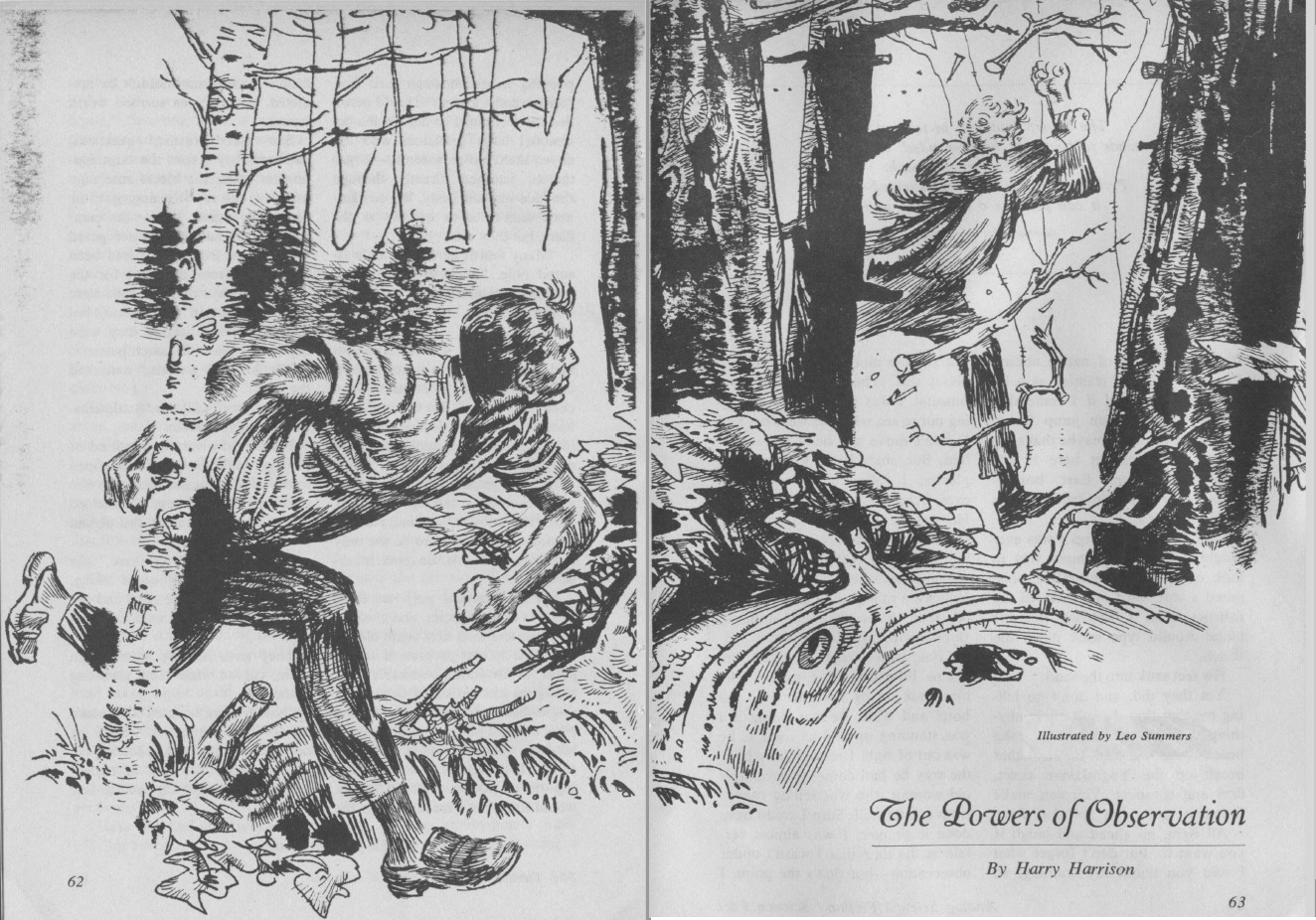
by Leo Summers
The Soviets have developed a new kind of super spy. He looks just like a man, but for some reason weighs over 400 pounds. If that leads you to guess that he's the Communist version of Hymie the robot from Get Smart, give yourself a cigar.
But the American agent tasked to pursue him through the back roads of Yugoslavia has a few gimmicks up his sleeve, too…
Well-written, but nothing spectactular. Three stars.
Steamer Time?, by Wallace West

As America grapples with its oppressive smog situation, some are calling for a return to the good ol' days—the days of the Stanley Steamer. I'm just a little too young to remember when steam cars battled internal combustion vehicles for supremacy, so I don't have the nostalgia for them that Wallace West infuses his piece with. The arguments for steam are largely that it burns clean, with its only waste gas being carbon dioxide (of course, while not strictly a "pollutant", there are other problems with it; viz. our 1958 article on the potential for industry-caused global heating). Steam engines were also more fuel-efficient, though I don't know if that's still the case.
The arguments against steam, to me, would be the long time to develop a head of steam. In the old days, waiting for your boiler to heat up was acceptable since the alternative was cranking up your IC car, and risking breaking an arm when the crank snapped back. With the invention of the electric starter, that became a non-issue. Perhaps the steam folks have a plan, too.
Anyway, the piece is readable, if a bit gushing. I'm sure the auto industry will never allow an IC competitor to emerge, although as we speak, two electric cars are racing across the nation, so who knows?
Three stars.
Hi Diddle Diddle, by Peter E. Abresch
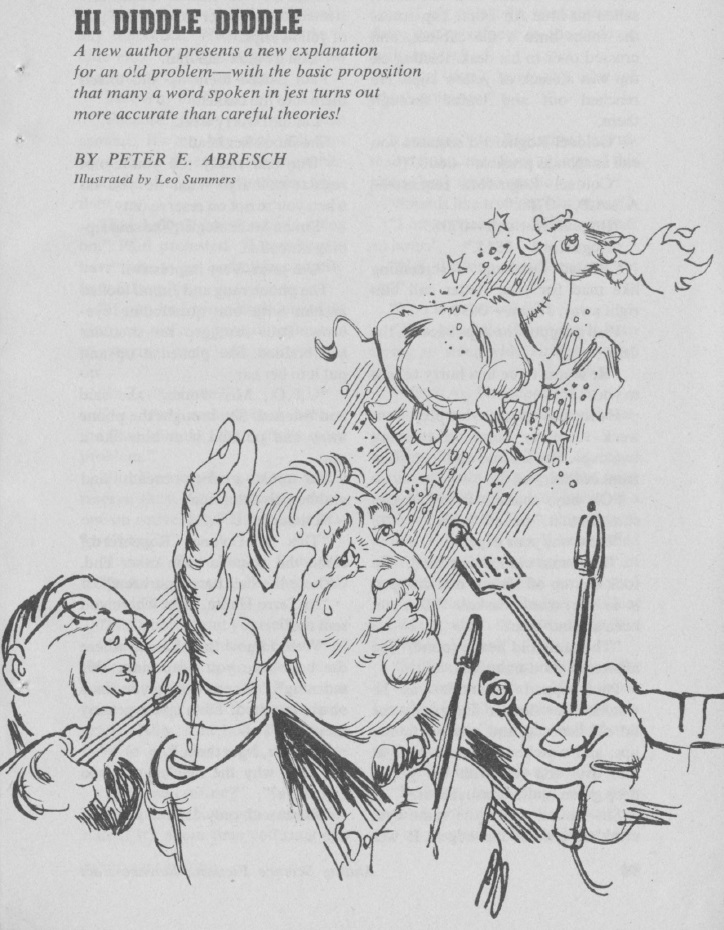
by Leo Summers
A harried reserve USAF captain, assigned to the UFO division, gets tired of all the cranks and reporters and spins a yarn for them: the cigar-shaped "ships" are really space cows feeding on the gasses of our upper atmosphere. His creation is recounted credulously, and hysteria sweeps the nation. Eventually, even Soviet agents are involved.
But what if the captain actually guessed too close to the mark?
This is a tedious story, and it just goes on and on. Analog rarely does humor well.
Two stars.
A Flash of Darkness, by Stanley Schmidt
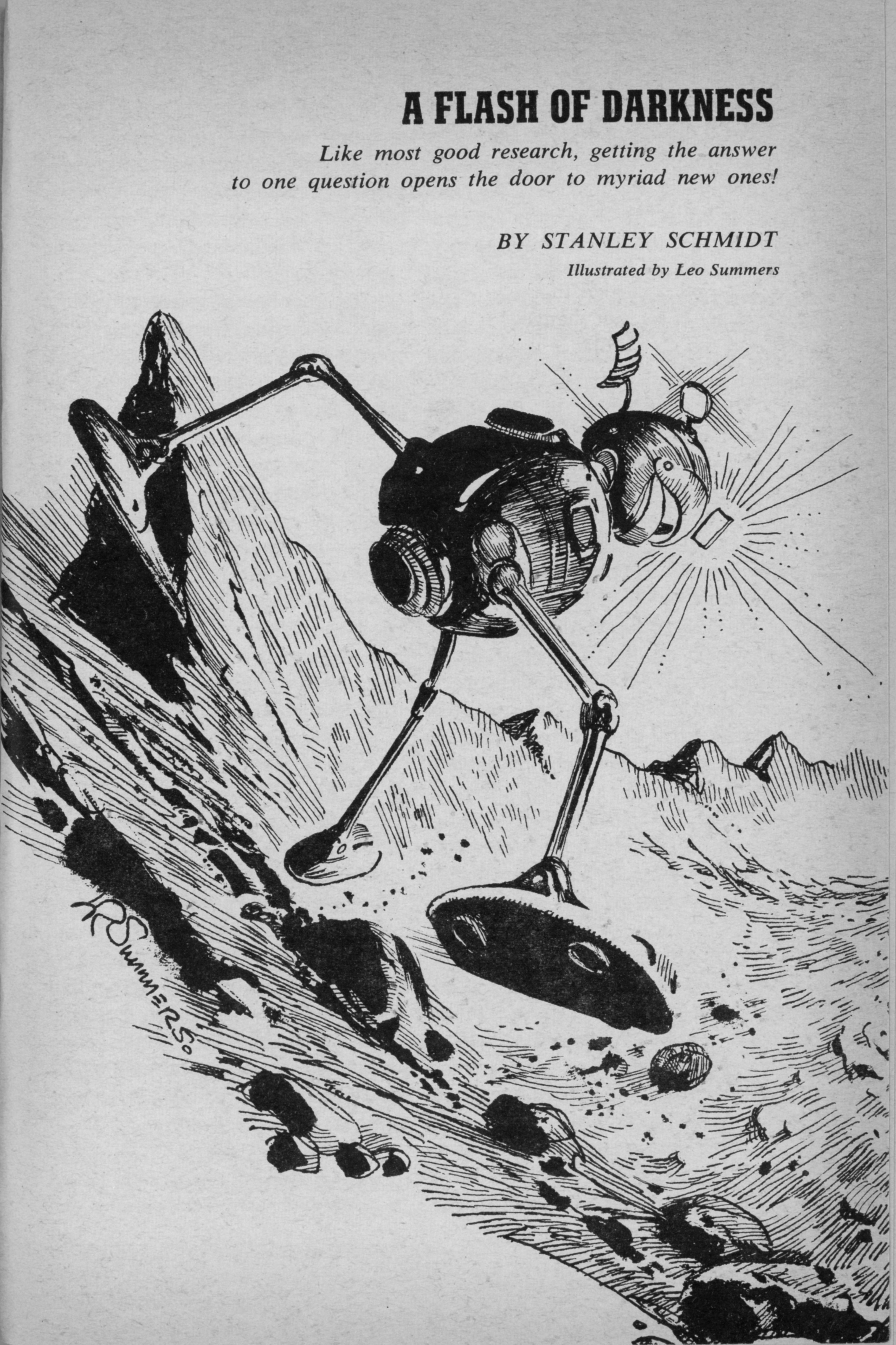
by Leo Summers
Mars Rover (MR) Robot is having a bit of trouble on Mars. The autonomous machine uses a holographic laser rather than a camera for navigation (apparently it's lighter; I don't buy it). When night falls, the rover finds its vision fogged and then blinded by something beyond its ken. It's up to the technicians back on Earth, and maybe a little intuition in MR Robot's mechanical brain, to solve the problem.
This could have been an interesting piece, but I felt the ending was a let-down. You'll see why.
Two stars.
Parasike, by Michael Chandler
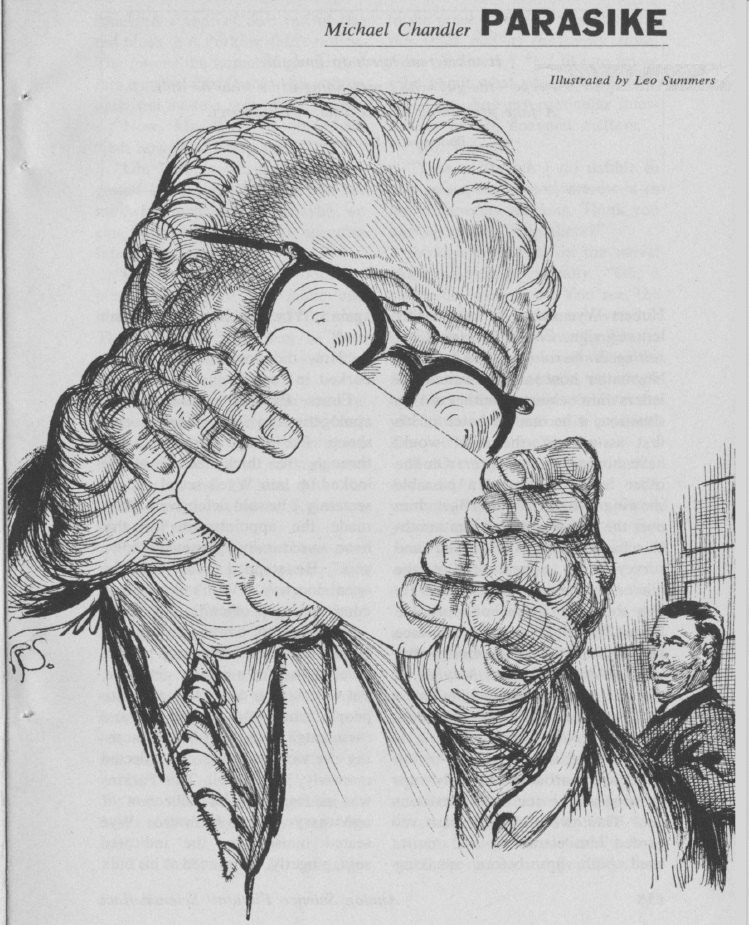
by Leo Summers
A fellow pretending to use numerology to make guaranteed stock picks turns out to be a quack of a different duck. He is promptly recruited by America's super-secret psi corps.
A lot of talking, a lot of fatuous acceptance of psi as science—in short, the perfect Campbell story.
Two stars.
Counting off
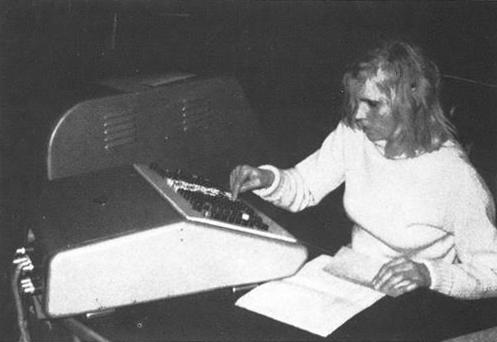
August has been one of the roughest months of one of the roughest years in recent history. Analog finished at 2.5, which is lousy, but not that far removed from the rest: Fantasy and Science Fiction (2.5), Amazing (2.6), If (2.9). Only Galaxy finished above the three-star barrier (3.1)
You could take all the 4/5 star stuff, and you wouldn't even fill a single issue. That's awful. Women were down to their usual publication rate, producing 6.5% of all new fiction this month.
It's going to take bold new leadership to change that trend, just as it will take bold new leadership to fix the country. That new leadership doesn't seem to be near in coming. I just hope we can withstand another Long Hot Summer…

by Gideon Marcus
Evitability
There are some things you can count on in life: death, taxes, the North Vietnamese violating their own Christmas truce more than a hundred times.
But sometimes, life deals you surprises. For instance, who knew that Hubert Humphrey was still alive? Yet he must be kicking for he is currently in Africa on a goodwill tour of the continent.


And, as a fellow exclaimed when I gave him a preview of my thoughts on this month's issue of Analog, "A five star story in Analog? Really?"
Well, it's true. Read on and find out how it happened!
Expect the unexpected

The Bugs That Live at -423°, by Joseph Green and Fuller C. Jones
First off, a very long article on the teething troubles faced by the developers of the Centaur rocket. This powerful second stage is used atop Atlas and Titan missiles to send big payloads to Earth's orbit and beyond. To do so, it uses liquid hydrogen as a fuel, which entails a whole host of problems.
There is a lot of good information in here, but as is often the case in Analog science articles, its presentation is confusing. There are no section breaks, so the whole thing runs together such that even I, a professional space historian, found my eyes glazing over.
I've no idea if "Joseph Green" is the same one who writes science fiction for UK magazines. Probably not.
Anyway, three stars.
There is a Tide, by R. C. FitzPatrick and Leigh Richmond

by Kelly Freas
A couple of years ago, R. C. FitzPatrick started a series of stories about a surgeon who has perfected the technique of human brain transplants. The first story was mildly interesting but prolonged, and the second veered heavily into the uncomfortable zone of eugenics. After all, the transplant of a healthy brain requires a donor body…and it's hard to find ones that aren't inhabited, and don't even the feeble minded have the right to their own corpus?
Tide is the third story in the series, and by far the best. There are two parallel, intersecting plots. One involves a brilliant young physicist with inoperable cancer, who comes to the surgeon's sanatorium to wait for a suitable "transplant" candidate. The second pertains to a self-styled "Duke" of organized crime. Intelligent, ruthless, and aging, the mob boss wants a healthy body to get a new lease on life. Surprisingly, the surgeon is willing to take the Duke's case, even before the mafioso breaks out the threats.
There are some important distinguishing characteristics between Tide and its predecessors. For one, it is now stressed that only the truly brain-dead are eligible "donors". It's not a matter of finding more value in a smart brain and a moronic one; only a virtually untenanted body is acceptable. The writing is far more compelling in this piece, too, with lots of interesting asides that flesh out the characters and the world they inhabit.
But most importantly, the ethical issue is confronted head on. It doesn't matter if the AMA or politicians or ethicists oppose the technology of brain transplants. Once that genie is out of the bottle, someone will take advantage of it–if not the scrupulous, then the unscrupulous. As the first (somewhat) successful human heart transplants of this month have shown, this technology is no longer a pipe dream. We will someday have to face this issue. I felt this story did a better job of addressing this problem than Niven's (still pretty good) The Jigsaw Man, which came out a couple of months ago.
So how did FitzPatrick manage to write such a good story when his others were middling or worse? You'll notice the second name in the byline. I have a strong suspicion that Leigh Richmond is responsible for most of this piece. Certainly, she's the new variable.
Five stars.
… And Cauldron Bubble, by Bruce Daniels

by Kelly Freas
Of course, what goes up…
Bubble is a piece in epistolary form about a near future in which the United States has scientifically developed dowsing and other hocus pocus into a full cabinet department. This would be a frivolous but diverting piece in F&SF, but knowing as I do that Analog's editor, John Campbell, actually believes in the efficacy of dowsing, well, it reads like propaganda.
Two stars.
The System, by Ben Bova
Bova offers up this two-page cautionary tale about the dangers of overdirection of scientific development. It kind of steps on its own toes to make its message, though.
Two stars.
Such Stuff As Dreams …, by Sterling E. Lanier

by Kelly Freas
A dashing young space navy commander signs up to join a top secret spy organization that has the real power in the galaxy. He is subjected to a number of tests, mostly to try his patience, before being given the final exam: a test of survival on an alien world. The dangers are of monstrous, almost unbelievable proportion, and the candidate wonders why.
Of course, the title of the piece gives it away.
Competent but forgettable. Three stars.
Dragonrider (Part 2 of 2), by Anne McCaffrey

by Kelly Freas
Lastly, the conclusion to what will likely be a three-part fixup novel. The planet of Pern is faced with deadly peril: the Red Star approacheth, and with it, onslaughts of deadly rhysome "threads" that despoil all living things that they touch. The only defense is fire-breathing, telepathic dragons flown by specially selected riders. The problem is only one of the six dragonrider weyrs is still in operation, and that one is woefully understaffed.
F'lar, the head rider, thought he had a solution to this problem when he learned that Lessa, the rider of the dragon queen Ramoth, discovered the ability to ride her mount through time. Last installment, the weyrleader sent his brother and a team back in time ten years to raise a new crop of dragons. Unfortunately, living more than once in the same time is detrimental to one's health, and the endeavor was largely a failure. Now, the only hope lies in the past, and an historical ballad about the wholesale departure of five weyrs some four hundred years ago–to destinations unknown…
There are the bones of an interesting novel here, although the gratuitous use of time travel as a plot point usually creates more problems than it solves. Also, By His Bootstraps stories tend to be dull since you already know what's going to happen.
But the biggest problem here is that McCaffrey just isn't quite up to the story she's trying to tell. A fine teller of short stories (The Woman in the Tower and The Ship Who Sang being standout examples), she struggles with the longer format. Her characters are shallow and unpleasant. The "romantic" relationship between Lessa and F'lar is disturbing when it isn't annoying. Lessa's theme song might well be, "He Shook Me, and It Felt Like a Kiss", and the only ones privy to F'lar's love for Lessa are the readers since the weyrleader is determined never to show affection for his lady. Ugh.
The doggerel that prefaces each chapter completes the mask of mediocrity on this promising tale. Perhaps a combo of Jack Vance and Rosel George Brown (R.I.P.) could have done Dragonrider justice. And maybe, as my colleague David suggests, a story between the first and second parts could have smoothed the transition (something to be fixed pending novelization?)
It really is a shame since it's rare to get a sweeping epic from the perspective of a woman, and the first part made me hopeful. As is, this last segment, and the three-part story as a whole get three stars.
Doing the math

When you put it all together, the January 1968 issue of Analog ends up at 3.1 stars, just on the positive end of the ledger. That actually puts it at the #2 spot for the month, just edging out IF (3.1), and losing to Fantasy and Science Fiction (3.3). The rest of this month's mags finished below the middling mark, with Fantastic at 2.9, New Writings at 2.8, and the abysmal new Beyond Infinity garnering just 1.5. As a result, though six magazines were released, you could fill just two of them with four and five star stories.
The big surprise, though, is the resurgence in feminine participation. Women contributed 13% of the new short fiction produced this month. While still a low number, it is comparatively enormous. And more surprisingly, the bulk of the woman-penned work (at least by pages) was published in Analog.
If even fuddy duddy Campbell can produce a progressive mag, I think we've got good times in store as the calendar turns to 1968! Happy New Year indeed…


by Gideon Marcus
Mags or paperbacks?
The latest issue of Yandro has got a nice piece from Ted White reviewing the latest (and best?) tome on science fiction by Alexei Panshin. The best part of White's article is his gentle but lengthy disagreement over the status of magazines versus paperbacks. Both White and Panshin agree that the paperback novel format is The Next Big Thing (indeed, it's already here), but they disagreed on their role and prospects.
Panshin sees the science fiction digests as a continuation of the pulps, with all the negative connotations attached thereto. He thinks they will eventually die. White strongly disagrees. Firstly, he notes that pulp does not equal bad–many extremely talented authors got their start cranking out a half million words for the old mags. Indeed, White says magazines are now populated by a stable of established writers who have perfected their trade while the paperbacks, since they are a buyer's market, will publish anything. Essentially, the books have taken the role the magazines had in the glut days of the early '50s.
White goes on to say that paperbacks are great, but 1) mags are the main outlet for short stories, and some authors are just better at the short form, and 2) editors keep mags going for the love of it. This means they are likely to survive longer than purely economic considerations would suggest.
It's a good piece. I'd give it a read.
The issue at hand
Speaking of which, should you give the strikingly covered latest issue of Analog a read? Well, if you're one of the 30,000 subscribers who gets it delivered, sure go ahead. If you're eyeing it at a newsstand, you'll want to read further…
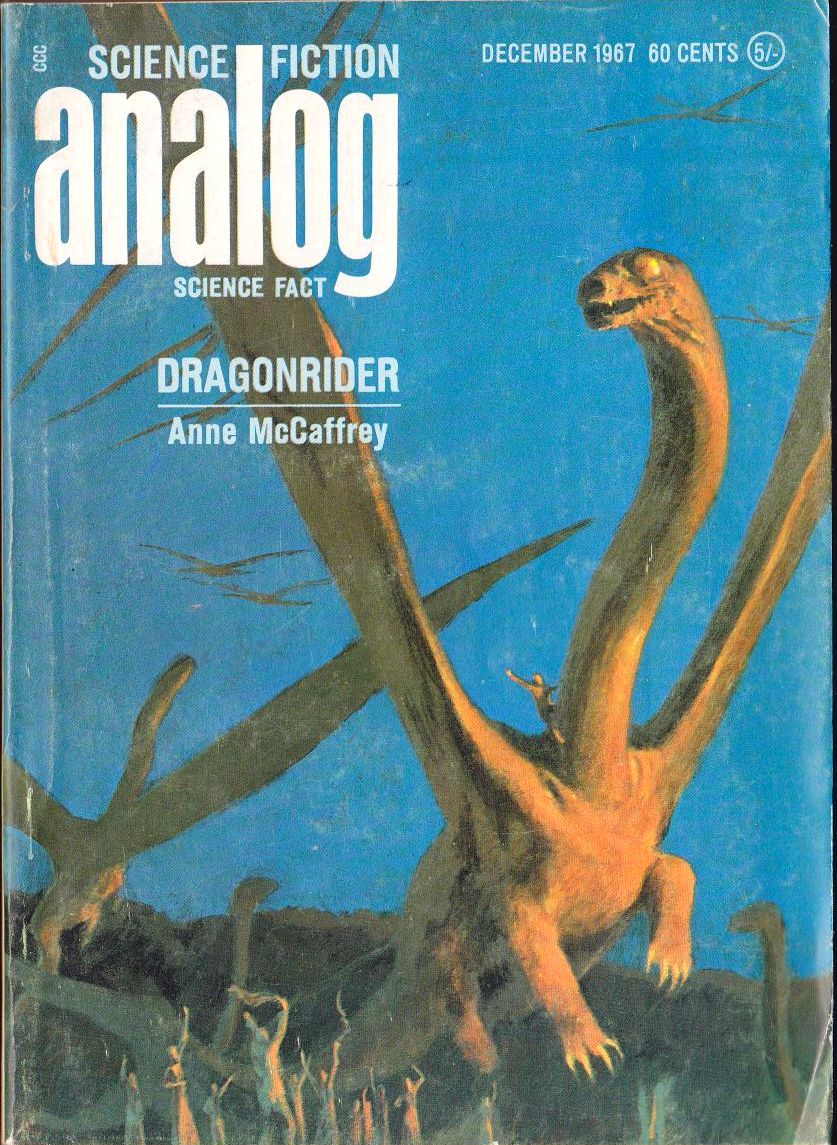
by John Schoenherr
Dragonrider (Part 1 of 2), by Anne McCaffrey
In Weyr Search, the first installment of this serial-in-all-but-name, we were introduced to planet Pern. It is a fraught former Earth colony, severed from its homeworld for thousands of years and ravaged periodically by rhizomic attacks from a nearby world. The only defense against the "threads" are fire breathing dragons ridden by telepathically connected humans.
The problem is it's been four centuries since the last attack and the "weyrs" of dragronriders have been allowed to go fallow. Only Benden Weyr is left, and it is woefully undermanned and underdragoned.
This latest installment in the saga of Pern opens up sometime after the last. Lessa, heir to the Hold of Ruatha and now Weyrlady by virtue of her communion with the dragon queen Ramoth, has shacked up with the F'lar, head of the dragonriders. Not because the two like each other, but because that's the law: Weyrladies and Weyrleaders must get hitched.
The thread has begun to fall, and the dragons are sorely taxed to meet the challenge, teleporting in and out of the frigid between to intercept the alien spores.
(Note: What do you call it when a dragon relieves itself between? An ICBM!)
Despite the perseverence of F'lar's crew, the thread has the upper hand–until Lessa accidentally discovers that dragons not only can teleport and telepath, but they can also time travel, too! (telechron?) As one might expect, this changes the whole equation…but maybe not for the better.
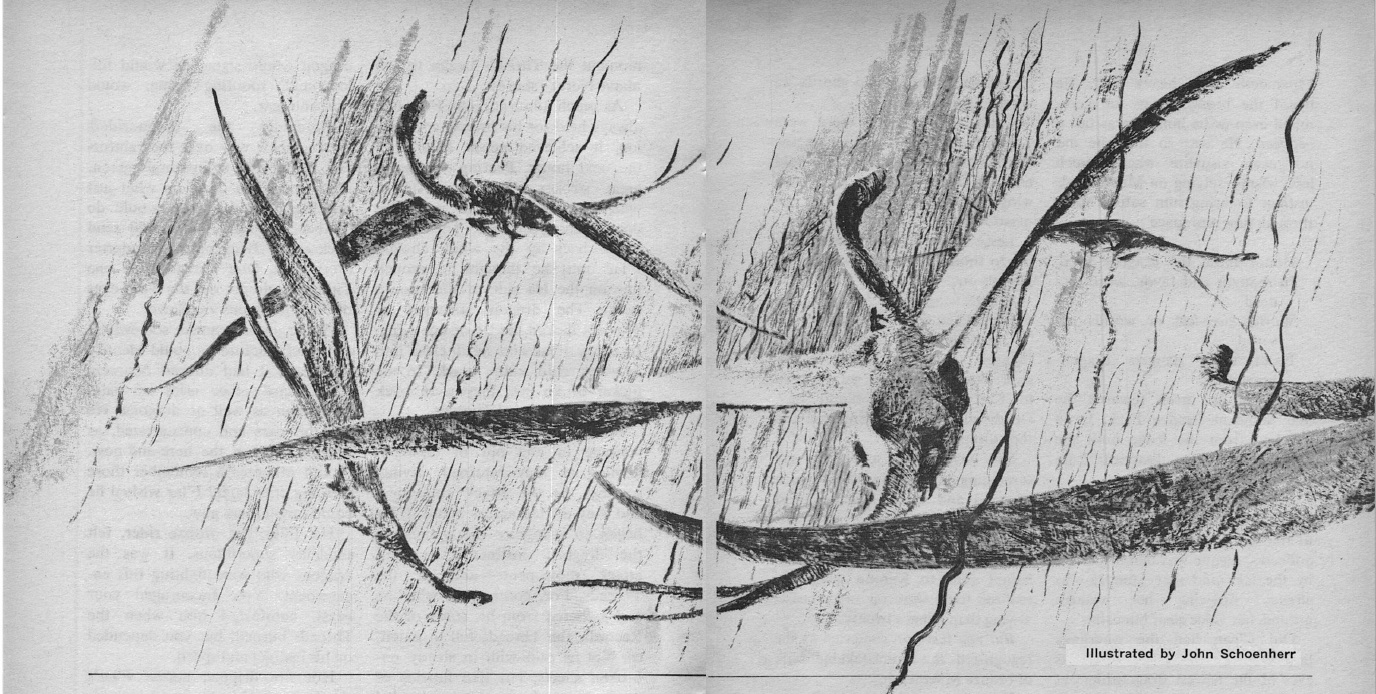
by John Schoenherr
I dunno. I was expecting a rousing Battle of Britain story, with never so much being owed by so many to so few. The thread would start gradually, the brave fighters would fight to their limits, and through ingenuity and tenacity, eventually win. The story would get extra points for being by and from the viewpoint of woman, a rare thing in science fiction, particularly in the mag that Campbell built.
Instead, the story is badly paced, lurching from scene to scene. There is no build-up to the thread strike, no mounting of tension; it is just suddenly upon them. McCaffrey throws psionic conceits against the wall to see which ones stick (Lessa not only discovers time travel, but she is the only one who can communicate with all of the dragons–unlike the other riders, who can only communicate with their bonded dragon).
Beyond that, the two main characters are thoroughly unlikeable, by turns yelling and sardonically sniping at each other. An element of violence suffuses their interactions, with F'lar and Lessa's couplings being referred to as not less than rape. It all feels very Marion Zimmer Bradley. I've said before that Lessa feels like a wish-fulfillment character for the author. This hypothesis is only becoming more concerning.
What's frustrating is I feel there could be an interesting story here in the hands of someone else. Jack Vance has already written a thematically similar tale with his The Dragon Masters. It's clear that Campbell wants Pern to be the next Dune, complete with striking Schoenherr covers. Thus far, I'd say McCaffrey isn't up to the task.
I was originally going to give the installment a bare three stars, but I think I've talked myself out of it.
Two stars.
The Destiny of Milton Gomrath, by Alexei Panshin
In this short short, an orphaned garbage collector spends his life convinced that his existence of drudgery is a mistake, and that someone, somehow, will rectify the mistake some day.
Turns out he's right, but that may not be a good thing.
This could be the start of a mildly entertaining Laumer novel. Instead, it ends right after the first punchline.
Blink and you'll miss it: three stars.
Whosawhatsa?, by Jack Wodhams

by Kelly Freas
Picture a world where a sex change is as complete and easy as an appendectomy…and reversible, to boot! Now picture the most complicated legal case possible involving a married couple seeking a divorce, both parties of which have swapped genders. And there are children involved, multiple paramours, probate issues, and a Strong Public Interest.
On the one hand, this story is a drag. The attempts to make it "funny", mostly consisting of endless scenes in which the judge assigned the case contemplates suicide rather than attempt presiding, are a flop. Also, one gets the feeling that if women's lib had advanced in the story as much as medical science, most of the legal issues and many of the social ones would be irrelevant. Particularly if 1) we could extend the legal rights currently afforded women in the federal government to all women, and 2) we could approach homosexuality with a less than medieval attitude.
That said…
There is very interesting exploration of what it means to change genders and the motivations that underly the desire to make such a transition. While the situation is made as ludicrous as possible, the subjects, for the most part, are taken seriously. I actually found the piece remarkably progressive, especially for Analog. Certainly, I've never read anything like it before.
Three stars.
Beak by Beak, by Piers Anthony

by Kelly Freas
An alien spacecraft orbits the Earth, neither communicating nor responding to communications. Meanwhile, a red parrakeet arrives at the home of a bird-keeper and joins his avian pet family for a time.
This is a pleasant pastoral piece that tries a little too hard to get its message across. Still, I'll read something like this a thousand times before I'll read Chthon again.
Three stars.
Venus and Mercury—Locked Planets? by R. S. Richardson
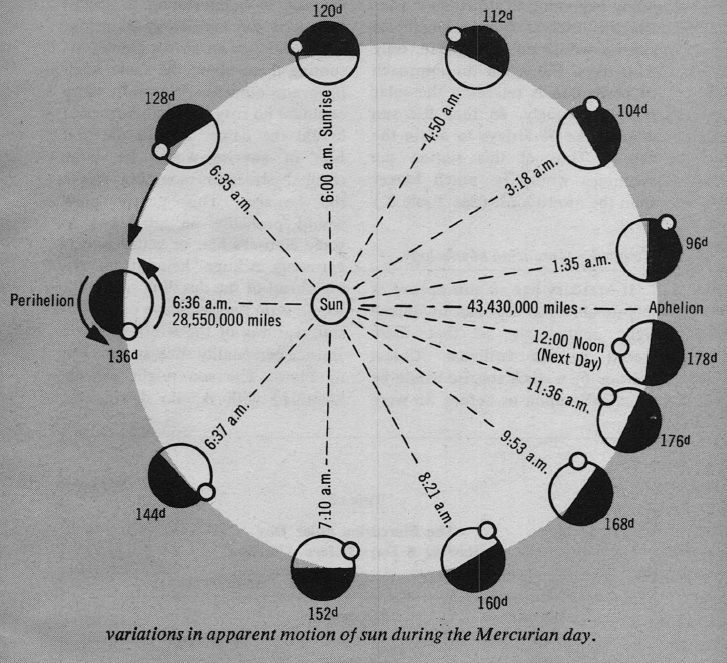
Dr. Richardson writes so-so science fiction, but I generally quite like his science fact articles. This one talks about the newly discovered rotation rates of Venus and Mercury, as well as what they might mean in relation to the history of the solar system.
On the one hand, I learned a bit, and that's significant given that I know a lot of astronomy. On the other, I felt the pictures were worth a thousand words, and I found myself skimming a lot of the text. In other words, maybe 20 pages wasn't necessary to make the point (God help us–next month's science article will be 10,000 words!).
Still, four stars.
A Question of Attitude, by Christopher Anvil

by Kelly Freas
A recruit for the interstellar patrol finds himself in an increasingly difficult series of imaginary tests, ones that stick him in mortal peril in a simulated alien planet environment. He seems to fail each one, ending up "dead", yet the Lt. Colonel in charge of training seems to think he has promise.
Normally, Anvil and Campbell are a toxic combination. This time around, the story is kind of interesting. I also rather enjoyed the nihilistic suggestion that the recruit's success is measured in the degree of his failure, and also that passing the tests only means his life is about to get worse. It fits with the whole zeitgeist of our current engagement in Vietnam. Even if Joseph Heller did it better.
Three stars.
Psi Assassin, by Mack Reynolds
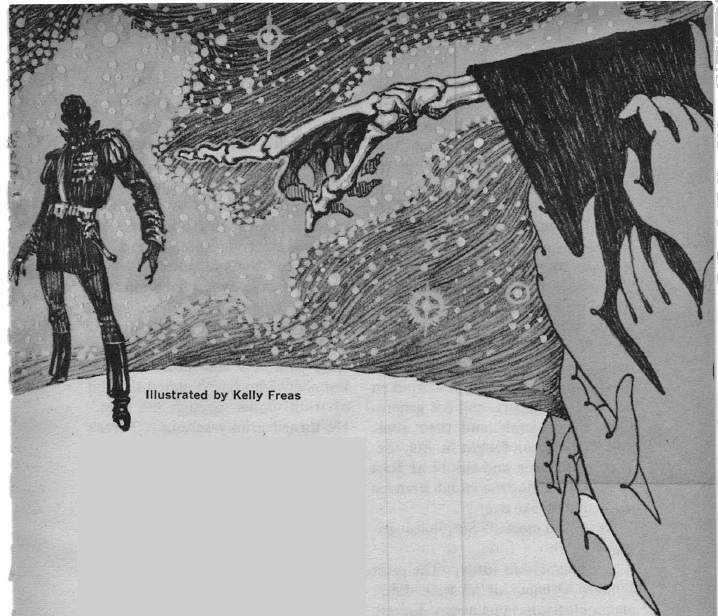
by Kelly Freas
Lastly, yet another of Reynolds' tales of Section G, the interstellar agency whose job is to make sure no human planet ends up too backwards, lest the race become prey to an ominous but yet unmet alien menace. This time, a psionic assassin is sent to kill the head of a Latin dictatorship. The problem: agent Ronny Bronston has already dispatched said leader and taken his identity!
We have all the hallmarks of a Reynolds Section G story: endless historical lectures (that never seem to have any object lessons beyond the mid-20th Century), flippant personalities that leach the story of any gravitas, the lone female agent (Reynolds never lets us forget her sex), and a happy ending.
Reynolds has done decent work with this series, but less often than not.
Two stars.
Doing the math

So who's right? Alex or Ted? Based on this month, I'd give the nod to Ted. While Analog was on the mediocre side, managing just 2.8 stars, other magazines fared much better. Both Galaxy and New Worlds scored 3.2 stars. Fantasy and Science Fiction was also pretty good (3.1). If was a bit tired, but par for the course (2.8), and while Amazing's 2.7 score puts it at the bottom of the pack, it actually is on an upward trend.
You could fill two magazines with all the superior stuff that came out this month, which is a good crop. Sadly, McCaffrey wrote the only woman-penned piece, and it wasn't very good (though it was better than Poul Anderson's novella in Galaxy).
I give magazines at least a few more years…
But that's not all we have for today. All the way from Australia comes this exciting stop press in the world of space news!:

by Kaye Dee
“Australia Joins the Space Club!”
Although Australia has supported American and British/European space efforts over the past decade, just yesterday, on 29 November we finally gained our own membership of the Space Club by placing our first satellite, WRESAT-1, into orbit. I’ve written articles previously about the first satellites of France and Italy, so it gives me great pride to report on Australia’s own satellite launch.

WRESAT-1 under construction in at the WRE
WRESAT-1 (WRE Satellite) has been a joint project of the Weapons Research Establishment (WRE) and the University of Adelaide, with significant support from the United States. In 1966, the Advanced Research Projects Agency (ARPA) offered Australia a spare Redstone rocket from the ARPA-led Project Sparta programme at Woomera as a satellite launcher. Sparta has been the final phase of a US/UK/Australian re-entry physics research programme commenced in 1960, investigating radar-echo phenomena created by re-entering missile warheads. The Sparta team even offered to prepare and fire the Redstone for the WRE.
“A Rush Job!”
The scientists and engineers involved in the Australian upper atmosphere research programme took advantage of the proposal to move their instruments from sounding rockets to satellite. However, the Sparta launch offer placed the satellite project on a very tight schedule, as the spacecraft would have to be ready for launch by the end of 1967, when the Sparta project would be complete and the Americans returning home. So, in just 11 months Australia’s, WRESAT has been designed, constructed, tested and was finally launched on 29 November. Its development has been an example of local “make-do” ingenuity, as much of the testing equipment needed was not available in the country.
Australia’s first satellite has been designated WRESAT-1 because my WRE colleagues hope that it will have many successors. Australia doesn’t yet have a space agency like NASA, but the WRE is putting a proposal to the Australian Government for a national space programme, and we hope that it will be funded, with the WRE formally designated as the Australian national space agency.

Diagram showing the internal layout of WRESAT’s systems and scientific instruments
Given the short development period, WRESAT’s scientific payload consists of instruments similar to those already flown in the Australian sounding rocket programme conducted in conjunction with the University of Adelaide Physics Department. The university team has developed a suite of instruments to study solar and ultra-violet radiation, atmospheric ozone and molecular oxygen density, as well as measuring the temperature of the solar atmosphere.
“Going Up From Down Under”
After an aborted launch attempt on the 28th, the Redstone lifted-off flawlessly on the 29th to place WRESAT into a polar orbit, where it is being tracked, and its telemetry signals recorded, by NASA’s Satellite Tracking and Data Acquisition Network – a service also generously provided free to Australia.

WRESAT soars on its way to orbit from Launch Area 8 at Woomera
Because of its short development time, a solar array could not be designed for WRESAT, and the satellite is only battery-powered. This means it will have a very short operational lifespan, but we expect it to gather a large amount of data on the upper atmosphere that will provide a check on the data already gathered by sounding rockets.
Let’s hope that WRESAT-1 marks the start of Australia’s true Space Age, and that this country will soon “shine as brightly as the Southern Cross”, as President Johnson has put it in his congratulatory telegram on our first national launch!

by Gideon Marcus
End of Summer
The long, hot summer is over, and with it a general cooling across the country, both in temperature and in tension. While San Francisco enjoyed a summer of love, with folks as disparate as Eric Burdom and Scott McKenzie coming to just be-in, the rest of the nation was rocked by civil strife, strikes, and protest.

Ashes in Cambridge, MD

Teachers on strike
And why not? The cities have been bubbling kettles for a long time, and too many mayors and councilmen are ignoring the problem. Too many workers have been stiffed and neglected. Too many young men, too young even to vote, have lost their lives in Vietnam.
Now, the strikes are largely settled in the workers' favor. The racial problems, well they're still there, but harder to ignore, and with the departure of sultry weather, tempers are a little less frayed. Vietnam…well, they had a free election didn't they? Surely things must be getting a little better.

Surely.
In any event, enjoy the respite. We're going to need our strength.
So goes the nation…
The nation of science fiction, that is. SF had a rocky summer, with a slew of lackluster magazines, inconsistent books, and of course, endless reruns on TV. I'm happy to report that the dog days are over, at least for now: not only has it been a good month for SF mags in general, but the latest issue of Analog is the best in more than a year and a half.

by John Schoenherr
Weyr Search, by Anne McCaffrey

by John Schoenherr
Jack Vance and Frank Herbert have made sweeping, quasi-fantastic tableaus the in thing. Universes that feel thousands of years old, with venerable, somewhat tattered institutions vying for power in a decadent setting. Now Ann McCaffrey, best known for her The Ship Who series, has tossed her hat in the ring.
Pern is a planet somewhere in the galaxy, once settled by Earth, but long since forgotten. It is a verdant, pleasant world save for one feature. Every few hundred years, a rogue planet comes close enough in its eccentric orbit to launch deadly spores of "thread". These burrow into Pern's soil, destroying native life, scourging farms and people.
To combat them, humans formed a sort of treaty with the native intelligent life: sapient dragons, with whom their riders bond telepathically. These dragons not only breathe fire, but they can teleport. This makes them formidable defenders, indeed! Clearly, they once dominated Pernian politics. Long ago, there were six "Weyrs"–barren fortresses wherein lived the dragons and their human brethren. From these strongholds, Pern was kept safe from the baleful "red star".
But humans have short memories, and when Weyr Search begins, it has been several centuries since the last orbital conjunction. Human politics have supplanted other concerns, and the "Holds", fortresses against human incursion, reign supreme. Only one Weyr, called Benden, remains in operation–a shabby shadow of itself.
Nevertheless, with the rogue planet approaching, and the queen of dragons recently dead, it is imperative that the Benden riders find a new rider for the next queen, one who has the requisite psychic talents and the necessary strength of character. Can any such person exist in these fallen times, when even proud Ruatha hold, whose royal family's blood once ran with a strong vein of dragon talent, has become a wreck under the cruel ministrations of Lord Fax of the High Reaches?
Well, of course the answer is yes. It's obvious from the first page, told from the point of view of Lessa, Ruathan scullery girl, who is secretly scion of the dead lineage. Weyr Search is not a story to surprise, a tale of twists and turns. It is not even really a complete story; it is clear there will be sequels. What it is, however, is an intriguing setup for a story.

As such, it really succeeds or fails on its writing. McCaffrey is better at her job than Herbert, whose reach regularly exceeds his grasp. She is less talented than Vance (who wrote a somewhat reminiscent tale several years ago called The Dragon Masters). The first portion of the story is a bit stiltedly told, and Lessa comes across as something of a caricature, a wish-fullfilment vehicle akin to Cinderella ("I may seem a nothing, but I'm really a secret princess-queen!") Not that this kind of character can't work–after all, look at Roan in Earthblood, but Laumer and Brown did a better job with it. And, of course, there are the tics that sold the work to Campbell: psionics and the idea of people being genetically special.
Nevertheless, the writing gets better as it goes along, and the concepts are interesting. I've read some great stuff by McCaffrey, and I've read some tepid stuff by McCaffrey. This installment gets four stars. We'll see how the serial (in all but name) does as a whole when its done.
(Note: There's a bit in the prologue where Pern's "Yankee" colonists are mentioned. I'll bet my bottom dollar this was a Campbell edit, as nowhere in the rest of the story is the race of the colonists suggested. Heaven forbid anyone but WASPs settle the galaxy…)
Toys, by Tom Purdom

by Leo Summers
I'm always happy to see a piece from my good friend, Tom. This one involves a cop duo (male and female) taking on a gang of pre-teenage kids, who have taken their families hostage using a host of homegrown weapons: genetically engineered apes and tigers, chemistry-set psychedelic drugs, erector-set shock guns. The work of the police is complicated by their standing directive to minimize casualties.
A little insight from the author:
I have a lot of thoughts on Toys. I gave a talk on it at a Philadelphia Science Fiction Society meeting this month.
Basically, it's built around three ideas.
The first came from a John Campbell editorial I read around 1950 or 51. What are you going to do, Campbell asked, when an angry teenager can blow up a city merely by twisting a pair of wires in a certain way? It's a thought experiment that gets at the heart of some of the issues raised by technology. I reduced the problem to a world where children have access to all kinds of potentially lethal technologies.
The second big idea is economic growth. I got interested in that years before, and it figures in many of my stories. The standard of living in the industrialized nation has been doubling two or three times per century since about 1700. The children in my story are lower middle class or might even be considered poor, but they have access to things like home genetic kits. They are poor in land, however, living in a five story house on a narrow plot. And lots of other kids have a lot more.
The third element is a Utopian police force. In a world with so much potential for violence, you need a first class police force and a society willing to pay for highly trained, well educated cops. Edelman [the viewpoint character] understands that he is supposed to resolve this situation without harming the kids. He takes bigger risks than he has to because he is responsible for the kids' welfare.
Thus, both utopian and anti-utopian predictions. Purdom excels at these concepts, painting a future world with realistic touches. For instance, complete equality of the sexes (exemplified by the cop partners), and one of the few stories that takes monetary inflation into account ($50,000 a year is a poor salary; $200,000 is pretty good.)
Where Tom always has trouble is combat scenes. It's no coincidence that his best works, like I Want the Stars and Courting Time, focus on people rather than fighting.
Toys is essentially a non-stop fight sequence. Thus, three stars.
Political Science—Chinese Style, by Research Group of the Theory of Elementary Particles, Peking
Editor Campbell offers up the preamble to a Chinese paper on subatomic particles, the realm of the "quark". The actual paper is not included; instead, we get many pages of explanation as to the philosophy that let to the composer's discoveries–all guided by the pure thought of their leader Mao Tse Tung.
It's pretty obvious that such folderol is necessary to get anything published in China. I'm sure the Nazi and Stalinist publishers had to do the same. What's special about this paper is that the science is reportedly "first-class". Which makes me sad that the whole paper wasn't included. Subatomic physics is fascinating stuff.
Anyway, it's short and interesting for what it is. And given the quality of fiction in this mag, I didn't miss the (hit and miss) science column too much.
Three stars.
The Judas Bug, by Caroll C. MacApp

by Kelly Freas
C.C. MacApp, using his first name rather than an initial for some reason, offers up this tale of a colony in peril. Two settlers of a new planet have been found dead in the field, their faces, throats and hands gnawed away. The fauna of the planet just don't seem harmful enough to be the culprit; Mechanic James Gruder worries that a human conspiracy is involved.
This is a perfectly competent story, although I found the resolution a little rushed. Three stars.
Free Vacation, by W. Macfarlane

by Leo Summers
I really liked the concept behind this story: Terran convicts are offered a choice–imprisonment, or teleportation to a roughhewn world as conscripted explorers. Day Layard, a brand new draftee, is paired with an old hand, who proves invaluable in keeping him alive. It turns out Layard's partner is particularly happy with his lot in life; it gives him the opportunity to seek out signs of the "Prodromals", the race of beings that preceded humanity in the galaxy.
This is another tale that runs along just fine until the somewhat rushed ending. An extra page or two would have perhaps garnered a fourth star. As is, a pleasant three.
Pontius Pirates, by J. T. McIntosh

by Leo Summers
The planet of Molle is a rich, advanced world, with nothing to hide. So why is it the moment Jack Sheridan makes planetfall from Earth, he is under 24 hour surveillance? Nothing formal, mind you–just subject to the attentions of four jovial fellows eager to get him drunk, and a pretty young girl employed to spend the night with him…or at least tell him she did when he wakes up with no memory of what went on the previous day.
Could it be that Molle is actually the home base for the piratical Buccaneers, and the surveillance is to make sure no one gets too close to the secret? That's certainly why Sheridan, actually an Interstellar Patrolman, was dispatched to the planet.
On the surface, this is just a secret agent thriller. The plot is interesting, but nothing noteworthy. The average reader will probably enjoy it and move on.
As a writer, I found much to admire. The thing is, Jack Sheridan is never wrong. He has his working theories, he tests them, and they always turn out to be more or less as expected. There are plenty of stories with characters like these, from Retief to James Bond, and they quickly run into one or both of two issues:
1) When you know the hero is always right, where's the tension?
2) When the hero knows he's always right, he tends to become insufferable.
McIntosh, who has been writing for two decades now, neatly avoids both pratfalls. The mystery is unfolded piece by piece, and at each juncture, Sheridan is plagued with doubt. He doesn't know if he's right, he lists all the reasons he could be wrong, and he explains what he'll do in that event. The thing is, he isn't some schnook like Bond who stumbles upon the truth. He lands on Molle with enough information to be pretty sure it's the Buccaneer base. After that, it's logical and plausible deduction.
We also learn a lot about Sheridan, his character and his values, without ever explicitly being told about them. It's a lovely piece of oblique writing, all showing and no telling.
So, well done, Mr. McIntosh. Perhaps others in Campbell's stable can learn from your example (*ahem* Chris Anvil). Four stars.
Doing the math

With a star-o-meter rating of 3.4 stars, Analog tops its competition. But competition it did have! New Worlds and Fantasy and Science Fiction both scored 3.3, and even Amazing got 3.0. Only IF and
Galaxy lagged, with 2.8 and 2.7, respectively.
If you took all the four and five star stories, you could fill two slim digests. The only really sad statistic is that, out of 33 new pieces of fiction, just one was written by a woman. Looks like women have struck out for books and screenplays, where the money's better. A smart move, but not a happy sign for magazines in general.
Nevertheless, let's dwell on the positive. Good job, Analog, and thanks for a happy punctuation to the month of September!
Speaking of books by women…
You've probably heard of Marie Vibbert, one of the biggest names in SFF magazines (of the far-future year 2022). Her book, The Gods Awoke, is what I've been calling "a new New Wave masterpiece":
Do check it out. You'll not only be getting a great book, but you'll be supporting the Journey!